




























The Biomedical Research Education and Training (BRET) Office of Career Development ASPIRE Program provides career and professional development enrichment activities for Vanderbilt University School of Medicine graduate students and postdoctoral fellows. The office was recognized in 2013 for its commitment to career development for biomedical sciences PhD students and postdocs through a BEST award, a $1.2 million, 5-year grant from the NIH Common Fund. The ASPIRE Program subsequently was awarded four Burroughs Wellcome grants for a business module, a data science module, a life design module, and a project management module.
Dr. Kim Petrie is Assistant Dean of Biomedical Career Development, Dr. Ashley Brady is Assistant Dean of Biomedical Career Engagement and Strategic Partnerships, Kate Stuart is Associate Director, and Angela Zito is Assistant Director. Mary Gray Lindstrom lends event and logistical support as Program Manager. Jan Varadarajan, PhD, is Assistant Director of Postdoc Support.
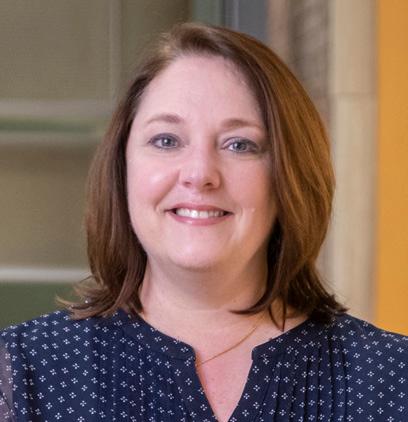
Kim Petrie, PhD
Assistant Dean for Biomedical Career Developament
Associate Professor of Medical Education and Administration
Ashley Brady, PhD
Assistant Dean for Biomedical Career Engagement and Strategic Partnerships
Associate Professor of Medical Education and Administration

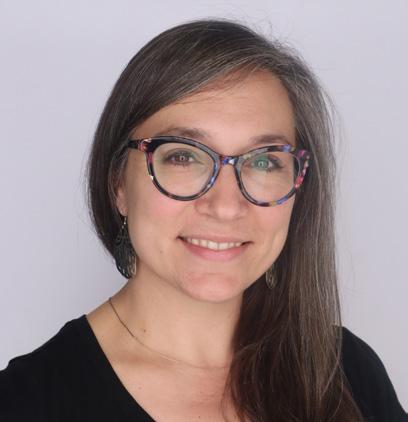
Kate Stuart Associate Director
Angela Zito, M.Ed. Assistant Director

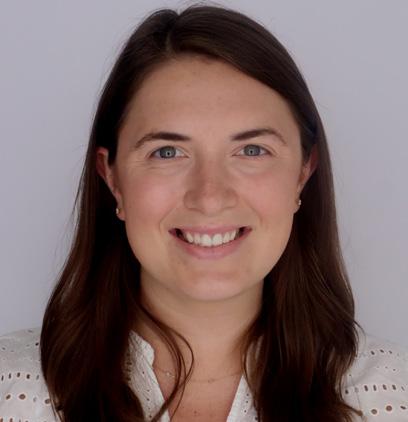
Mary Gray Lindstrom Program Manager

Janani Varadarajan, PhD
Assistant Director, Postdoc Support
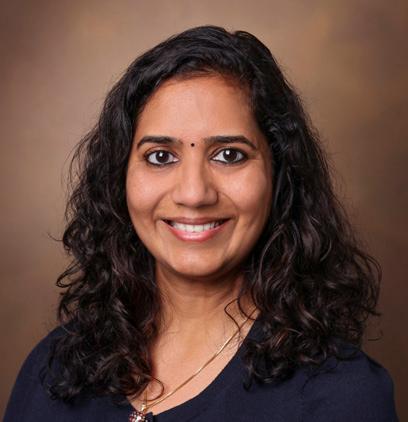
ASPIRE Program • Office of Career Development • Biomedical Research Education and Training Vanderbilt University School of Medicine Basic Sciences bret.career.development@vanderbilt.edu
The ASPIRE Program serves PhD students and postdoctoral fellows in the biomedical and life sciences. ASPIRE activities and individual advising are tailored for BRET-affiliated PhD graduate students and postdocs, and our events are open to the VU Community.
Postdoctoral Departments served
Allergy/Pulmonary

PhD Programs served
Biochemistry
Biological Sciences
Biomedical Informatics
Biostatistics
Cancer Biology
Cell & Developmental Biology
Chemical & Physical Biology
Epidemiology
Health Policy & Health Services Research
Hearing & Speech Sciences
Human Genetics
Interdisciplinary Graduate Program
Microbe-Host Interactions
Molecular Pathology & Immunology
Molecular Physiology & Biophysics
Neuroscience
Pharmacology
Quantitative & Chemical Biology Program
Anesthesiology
Biochemistry
Biomedical Informatics
Biostatistics
Cardiac Surgery
Cardiology/Cardiovascular
Cell & Developmental Biology
Clinical Pharmacology
Diabetes/Endocrinology
Emergency Medicine
Epidemiology
Gastroenterology
Genetic Medicine
Health Policy
Hearing & Speech Sciences
Hematology/Oncology
Infectious Disease
Molecular Physiology & Biophysics
Nephrology
Neurological Surgery
Neurology
Obstetrics & Gynecology
Ophthalmology & Visual Sciences
Orthopaedic Surgery
Otolaryngology - Head and Neck Surgery
Pathology, Microbiology and Immunology
Pediatrics
Pharmacology
Plastic Surgery
Psychiatry and Behavioral Sciences
Rheumatology
Surgery
Urology
Vanderbilt Kennedy Center
Vanderbilt University Institute of Imaging Science
Providing opportunities to explore careers is paramount to the ASPIRE program. Many of the foundational activities of the office are aimed at instilling confidence and facilitating career decision-making.
The ASPIRE Program hosts a weekly CV/Resume Drop-In Clinic for VU and VUMC biomedical sciences PhD students and postdoctoral fellows. The members of the ASPIRE team will review CVs, NIH biosketches, resumes, LinkedIn profiles, or other professional documents used in a job search. No appointment is needed.
The ASPIRE Team meets with graduate students and postdoctoral fellows by appointment to discuss career exploration efforts and professional development topics. Topics include any aspect of the professional development or job search journey:
• preparing and applying for academic positions and post-docs
• graduate school survival skills
• salary negotiation
• presentation skills and interview tips
• writing CVs, resumes, and cover letters
• opportunities for scientists outside the academe

72 Drop-Ins
261 Individual Appointments
155 PhD Students
86 Postdocs
13 Alumni
7 Others

With ever-increasing career options for our PhD students and postdocs, many struggle to know if academia, government, non-profit, or industry would be a good fit for them, and why, and many find it difficult to know where to begin searching for their next role and what others like them have done.
The Beyond the Lab podcast is aimed to help trainees better understand career options in a widely accessible format and at a pace that they can choose. Beyond the Lab was first launched in 2013 as a YouTube video series and then transitioned to a successful podcast beginning in 2017. The series has over 110 episodes in which biomedical scientist alumni are interviewed about their professional journey and career. The standard format asks the interviewee about their time in training, the transition to their next role, and the actual details of their workday. Episodes foster insight into skill building, networking, job search strategies, and reflection about how time in PhD or postdoctoral training prepared them for their job.
Season 7 was recorded in 2023-2024. Beyond the Lab series covers 30 different career categories and has been downloaded over 21,000 times. The podcast format makes career information easily accessible while multitasking at the bench, on a walk, or even in the car by listening via iTunes, Soundcloud, Spotify, or directly from the ASPIRE website, which lists all episodes by category.
116 Episodes
30 Career Fields Represented
3,790 Downloads this Year
21,976 All Time Downloads



Top, all speakers of the 2024 Annual Career Symposium featured above.
Above, Dr. Kim Petrie talks with former student and current speaker Meagan Quinlan. Right, top to bottom, Kate Stuart and Mary Gray Lindstrom oversee from the back of the ballrooms. Trainees pick up registration documents.
Speaker Isaac Zike and Henry Henderson speak with attendees.
By Alexandra Scammell, Vanderbilt Basic Sciences
On May 31, the Office of Biomedical Research Education and Training’s ASPIRE Program hosted its yearly career symposium, bringing together biomedical science professionals, including basic sciences alums, to speak about their jobs and share their diverse career pathways with more than 200 attending biomedical graduate students and postdoctoral fellows. This year’s theme, “A Kaleidoscope of Biomedical Science Careers,” emphasized the variety of roles available to trainees once they complete their training, from research and academia to industry and government.
“The ASPIRE Annual Career Symposium is an excellent opportunity for our trainees to explore careers and has proven particularly effective because they hear from former graduates of our own PhD training programs,” Walter Chazin, senior associate dean of BRET, said. “The fact that we have so many alumni who are highly motivated to come back to campus to share their stories and network is a powerful testament to the success of our graduate training in the biomedical sciences.”



Every year, BRET brings back a handful of alums to discuss career opportunities for biomedical sciences PhD’s and the diverse landscape of biomedical careers with current trainees.


“Our PhD and postdoctoral alumni go on to become leaders in many spheres, both in and beyond academia,” Kim Petrie, director of the ASPIRE program. “If a typical PhD student connects with career symposia during each of their five years in grad school, they can build their professional network by 50–60 people!”
In addition to these alum speakers, the opening keynote talk was given by communications expert Jean-Luc Doumont, whose background is in engineering and applied physics. Currently, Doumont trains researchers, engineers, managers, and other professionals to effectively communicate, think critically, and enhance other professional development skills.
“It was refreshing to hear a talk with practical advice from a trained scientist!” Cherie Saffold, graduate student in the molecular pathology and immunology graduate program, said.
In tandem with the day’s talks, symposium participants engaged in dynamic networking sessions and discussions on topics ranging from effective communication and grant writing to navigating the job market and developing a personal brand. One hands-on workshop, “How to Network,” was designed to help attendees build skills necessary for successful careers. Cherie Saffold networking at the 2024 ASPIRE Career Symposium
“Networking is a skill, and no one has ever taught me how to do it,” Saffold said. “[In the workshop], I felt like I learned some concrete step to practice and improve my networking skills.”
Like Saffold, many attendees left the day with valuable connections and insights that could lead to future collaborations and career advancements.




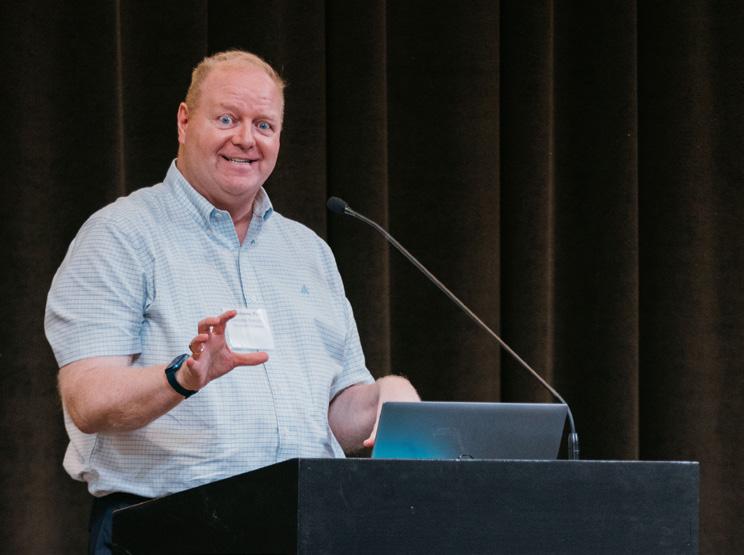
Top, trainees enjoy the casual networking reception at the end of the symposium. Second above, Kristin Burnum-Johnson speaks candidly at the Fireside Chat. Inset, keynote Karissa Culbreath meets a graduate student. Above, Eric Johnson shares his industry experience. Below, Jean-Luc Doumont conducts the workshop on “Networking for Researchers.” Left, trainees mingle between sessions.



By graduate students Christopher Williams and Kateryna Nabukhotna
Deciding on one’s future beyond graduate school or a postdoc fellowship is a daunting task. But for us and 10 other School of Medicine Basic Sciences students, the Office of Biomedical Research Education and Training helped facilitate the next steps in our careers.
Our group of trainees had the unique opportunity to travel to Boston in May to visit biomedical companies new and old, large and small, through the ASPIRE on the Road program. Throughout the tours, we found comfort among the familiar, including our favorite lab equipment, caffeinefueled science, and the smiles of fellow Commodores.
Before hitting the road, all 12 participants submitted a cover letter and resume to the BRET Office in which we demonstrated our interest in the program and the pursuit of a career in industry. Many of us were unsure of precisely what to expect on this trip, but thankfully Ashley Brady, assistant dean of biomedical career engagement and strategic partnerships and the trip’s organizer, went to great lengths to ensure we were exceptionally well prepared for any and all professional situations. We gathered for two meetings ahead of the trip in which we discussed trip logistics, how to dress, backgrounds of the companies we were visiting, the individuals from each company who would host us during these visits, and more. Needless to say, by the time we landed in Boston, we were ready to go!
Our first stop on the trip was MOMA Therapeutics, a biotech company with fewer than 100 employees that specializes in developing small molecule inhibitors of MOlecular MAchines (enzymes that create force, work, and motion and that give the company its name). A panel of employees from different departments within the company showed us just how critical collaborative work is at a smaller organization, where enthusiasm to learn and help others is indispensable when driving innovation.
On day two of our trip we visited several larger pharmaceutical companies, including Sanofi, Johnson & Johnson, and Merck. Our conversations with employees at these companies covered just about

everything, including company structure and organization, hiring processes and tips for application success, the enormous breadth of positions and functional roles within these organizations, and more.
“It was so inspiring to meet the next generation of scientific talent! The ASPIRE program is such a valuable resource for the biomedical graduate program by providing a way to introduce some of Vanderbilt’s graduate students to careers outside of academia and, importantly, to network with former alums,”
said Roshi Afshar, Ph.D.’05, principal scientist at JnJ Innovative Medicine.
“I appreciated the questions and interest the students had as they gained exposure to what life is like for different roles in industry, and, as someone who knows firsthand how difficult that leap from academics to industry can be, I hope they were able to take home some nuggets of inspiration and learnings as they navigate the next phase of their careers.”
sleek and modern lab spaces with powerful equipment and ample resources for cutting-edge research, but made sure employees were well hydrated and caffeinated. Espresso machines, sparkling water dispensers, and cold brew on tap were fixtures of each laboratory visit that we were always sure to take advantage of!

Opposite page, the group visits The Engine Accelerator; below the group poses for a photo before arriving at Sanofi. Above, the ASPIRE on the Road trainees gather at MOMA Therapeutics. Below, Council of Visitors member Asit Parkh shares his experience at MOMA Therapeutics.

The next day included visits to incubator spaces that house (very) small biotech startups that often have just a few employees. Many of these companies occupy less bench space than our own labs at Vanderbilt but maintain access to what is otherwise prohibitively expensive equipment and resources.
Before returning to Nashville, we made one last stop at Dewpoint Therapeutics, a smaller biotech company that targets biomolecular condensates. Researchers at Dewpoint showed us how their novel compound-screening pipeline integrates artificial intelligence to discover compounds that modulate the behavior of cells.
Each company—regardless of size—provided not only
An exciting networking opportunity took place during the Vanderbilt Alumni Networking Happy Hour. Before this event, we were provided a list of attendees and their current occupations so that we could identify specific people we hoped to connect with. The happy hour kicked off with a greeting from the dean of Basic Sciences, John Kuriyan, and provided an immediate sense of Vanderbilt community. As the evening went on, we had friendly, helpful, and meaningful conversations with Vanderbilt alums and ended up meeting and interacting with more people than we originally anticipated.
A significant and unique aspect of the trip was the ability to gain firsthand information about industry career paths directly from scientists who had a range of roles within different companies. As many of us have a longterm objective to transition to a career in industry, we were specifically curious about what we could currently do as graduate students and postdocs to increase our chances of being successful applicants for industry roles.
We learned specifics about each company’s positions and interview processes. These behind-the-scenes details were tremendously helpful as we look to start navigating the application process and search for the appropriate job match. We also garnered general insights into the qualities


and skills that are critical for getting a job in industry; employees at each company repeatedly mentioned networking as one of the essential factors that can help us stand out from other applicants. Having internal reference contacts can also make a notable difference during the hiring team’s decision-making process.

The ASPIRE on the Road trip was an outstanding opportunity for each of us to grow our networks. At every company, we met scientists at different career stages who specialize in various research areas, which enabled us to establish the most relevant networking contacts based on our individual scientific and career interests.
It was a pleasure to be a part of this year’s ASPIRE on the Road group. Although most of us did not know each other before the trip, all trip participants became quick friends who connected thanks to our common interests. It quickly became apparent that the group consisted of ambitious, curious, open-minded, and driven people ready to ask questions and maximize opportunities. We networked with each other and bonded throughout the trip, particularly during an inspirational walking tour of Kendall Square, one the most innovative spots on the planet due to its high concentration of biotech and pharma companies.
We returned to Nashville feeling inspired and ready to make well-informed career decisions that will hopefully bring us one step closer to our future dream jobs!


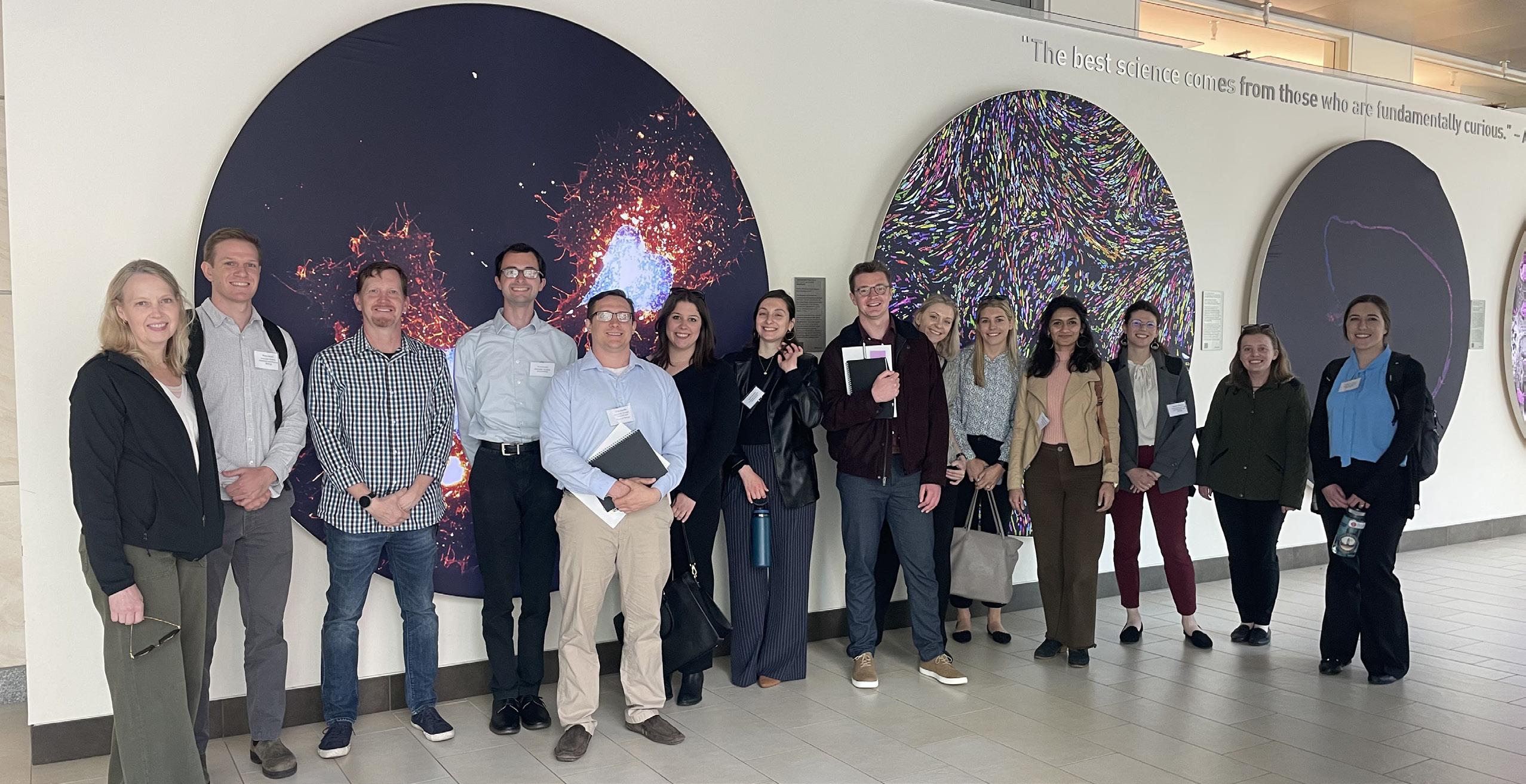


Opposite page, top, the group visits Johnson & Johnson Innovative Medicine; middle left, Council of Visitor member Lori RudolphOwen and Ashley Brady; bottom, the group on a rooftop at Sanofi. Current page, above, the group tours Kendall Square with alumni tour guides. Left, trainees pop over to the Broad Institute. Below left, Sanofi graciously hosted our trainees for a tour of their facility. Below, all participants with Ashley Brady at MOMA Therapeutics.









By Vanderbilt University
Three Vanderbilt graduate students traveled to Washington, D.C. for the Catalyzing Advocacy in Science and Engineering Workshop hosted by the American Association for the Advancement of Science. The workshop provides an opportunity for students from around the country to learn from experts about the role of science in policymaking and the federal policy-making process. The Vanderbilt Office of Federal Relations has been sponsoring graduate students to participate in the AAAS CASE workshop for a decade.
The program aims to empower students to leverage their scientific expertise to shape public policy. Sessions covered a spectrum of topics, ranging from science policy, career pathways and the federal budget process to science communication skills and advocacy. Participants also learned how congressional offices and federal agencies operate and what it’s like to work there.
On the final day of the workshop, the Vanderbilt graduate students met with staff in four congressional offices, specifically those working in the intersection of science and policy. The staffers shared their perspectives on how scientists can advocate to shape public policy. The meetings were arranged by Vanderbilt’s Federal Relations team, offering a uniquely comprehensive experience for the Vanderbilt students.
“As a PhD student knowing I don’t want to continue into academia, science policy is the answer to so many questions I had about how to use my expertise in the government sector,” said Lauren Bellocchio, PhD candidate in Chemistry. “This workshop taught me about how the federal budget is used for promoting science and technology policy, and I gained the invaluable firsthand experience of speaking directly with policymakers on Capitol Hill.”
Logan Northcutt, PhD candidate in Cancer Biology, added, “I really learned a lot about policymaking and how funding for science is influenced by government priorities. I would highly recommend the AAAS CASE Workshop to anyone who is interested in science policy.”
Vanderbilt’s Office of Federal Relations works in close partnership with the Graduate Leadership Institute and the Office of Biomedical Research Education and Training ASPIRE program who select the students who participate each year.
“I’m thrilled to continue bringing students to Capitol Hill as part of the AAAS CASE program,” said Heather Bloemhard, associate director of federal relations. “The workshop is an excellent opportunity for both professional development and civic education; it is gratifying to see them gain valuable insights into science policy and advocacy and learn how they can have a meaningful impact on policy as both citizens and scientists.”
For students and post-docs interested in exploring careers in science policy or advocacy, Vanderbilt’s Office of Federal Relations hosts a biennial Federal STEM Policy & Advocacy Seminar. This program, inspired by the AAAS CASE Workshop, offers content tailored to the interests of the Vanderbilt community. The next seminar is tentatively scheduled for fall 2024 in Washington, D.C.
The Division of Government and Community Relations is committed to fostering civic engagement and advocacy among students, faculty and staff. Students can learn more about how to be an engaged citizen in the Student Advocacy Guide.


A long-standing tradition since 2011, PhD Career Stories is a monthly seminar series for trainees to learn about the varied careers a biomedical science PhD can pursue. The informal event features alumni who can offer insight into working post-PhD. This past year, the ASPIRE program hosted speakers who shared their experiences in:
Research Development Management Consulting
Medical Writing Industry Postdocs
Clinical Laboratory Medicine
Patent Law
Product Management
Entrepreneurship
Product Design and Development

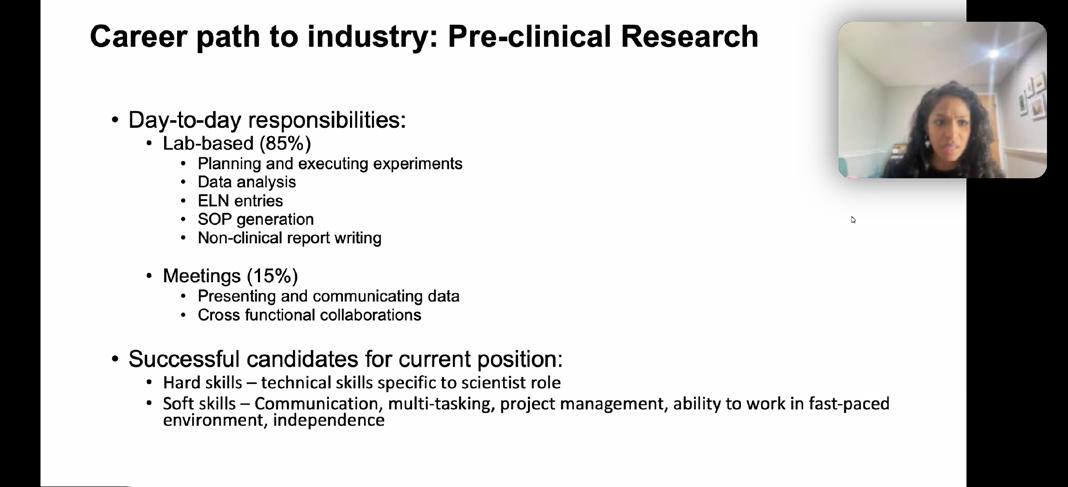


PhD Career Stories about Industry Postdocs.



By Minh “Amy” Tran, graduate student
In October 2023, I, along with a select group of biomedical PhD students and postdoctoral fellows, had the opportunity to travel to St. Louis, Missouri, a national hub for biopharma and plant biotechnology, to explore potential careers and learn about working in the pharmaceutical and biotech industries firsthand.
Before the trip, Ashley Brady, assistant dean of biomedical career engagement and strategic partnerships and the trip’s organizer, prepared a pre-information session for us, which was incredibly helpful. During the session we reviewed the companies and leaders we would visit, thought through what our discussions should entail, and considered what types of careers each company could facilitate. We also discussed how to best position ourselves for networking opportunities, and got to know our peers. Ashley ensured we would make the most out of this field trip experience!
On our first night in St. Louis, we enjoyed dinner with biochemistry alum Larry Thompson, PhD’06, associate research fellow at Pfizer Research & Development, who helped organize the trip. It was encouraging to connect with a fellow researcher who had once been in our position and successfully transitioned into a career in industry.
Larry’s willingness to pave the way for future students was inspirational and I hope to do the same for future Vanderbilt Ph.D. students someday.
“I remember sitting at my desk in the lab at Vandy while I was job hunting and making a promise to myself that if I ever made it across the abyss to the other side that I would do everything I could to help all the students possible navigate that unknown as well,” Thompson said. “The opportunity to share all the information available to help [the ASPIRE on the Road participants] see what we do and how they could fit into to that framework was very rewarding. I hope it gave them some faith that finding an industry role that fits into their career plans is possible. I hope their visit inspired them that they too could have impact on patients’ lives.”
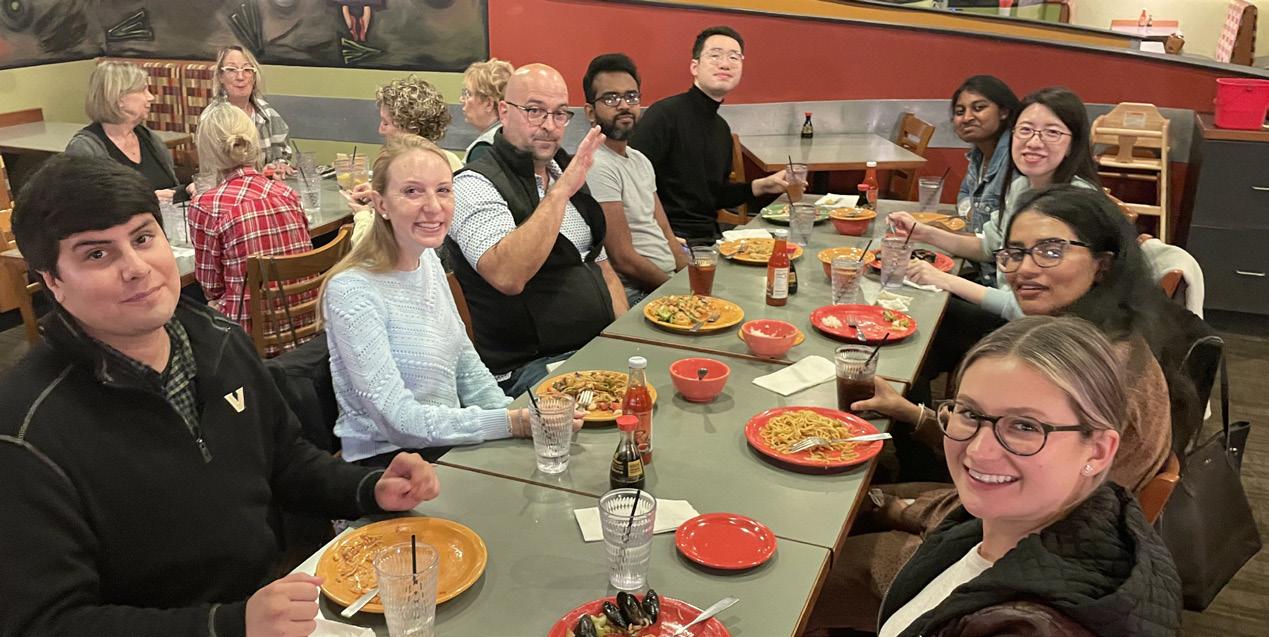
Our visit to the Donald Danforth Plant Sciences Center, one of the largest plant research centers in the area, broadened my perspective on biotech as my scope had always been biomedical research aimed at disease prevention through vaccines. At Danforth, where labs are funded by the center and federal grants, we learned how improving plant and food production, increasing crop nutrition, and enhancing crop resistance to harsh weather and diseases can also improve human health. It was


fascinating to discover that many scientists on staff came from fields like genetics, biochemistry, and structural biology and not plant science like we expected. It was illuminating to understand just how transferable a PhD’s skillsets can be, even if more background knowledge needs to be acquired once on the job.
We met Elliot Kellner, the director of commercial innovation on Danforth’s innovative partnership team. His career path was particularly inspiring: Starting as a faculty member, he realized his strength lay in communicating and explaining scientific ideas. This led him to a role in commercializing research into patents and products. He showed us that research and development is not the only career path for biomedical science trainees and that there are multiple roles that can leverage our personal strengths while allowing us to remain passionate and involved in science.
The second day of our trip was focused on visiting the larger pharmaceutical companies Bayer Crop Sciences and Pfizer. At Pfizer, we toured the facility and met with various staff working on analytical, bioprocess, and pharmaceutical R&D. We enjoyed networking with Pfizer employees, who were open and shared valuable career advice. Deepika Nambiar, a protein scientist who completed her postdoctoral research at the Vanderbilt University School of Medicine, emphasized the importance of being proactive about professional development, taking advantage of the numerous classes, soft skills training, and internal job postings that are made available at any place you work for.
The networking continued into the evening at a happy hour organized as part of the trip. Around 30 alums joined us, all friendly, helpful, and eager to get to know us and share their wisdom. In speaking with the alums, the fact that diverse career paths are available after we earn our degrees, from postdocs and business/product managers to pharmaceutical sales representatives, became crystal clear.
Our visit continued with a visit to BioSTL, a nonprofit focused on growing the city’s


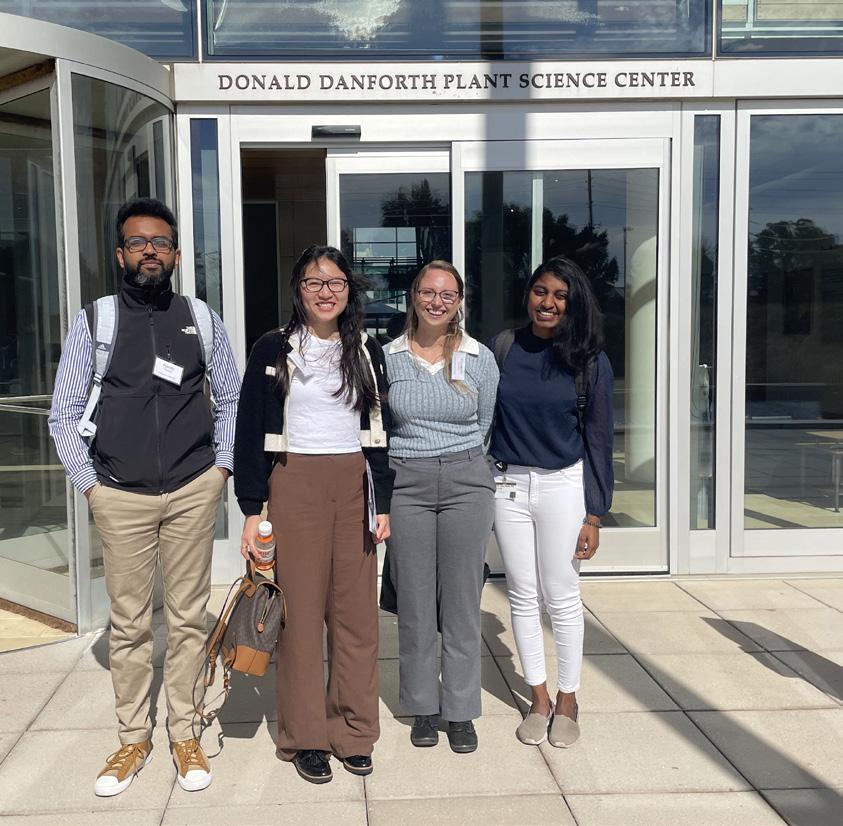
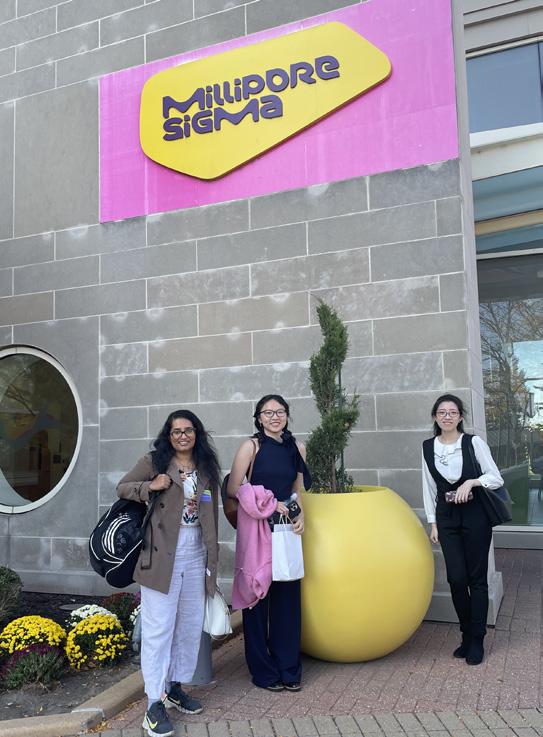
biotech ecosystem. The BioSTL team of PhD scientists scout for biotech startups, conduct market research to assess their potential, and invests in or incubates them to help them succeed. This fast-paced, market-driven environment appealed to those of us on the trip who were interested in business and entrepreneurship.
Millipore Sigma was the last stop of the trip. There, we had the opportunity to learn about their process for developing assay kits for labs and companies. A friend and postdoctoral fellow in the lab of Walter Chazin, Randika Perera, made a connection during this visit and ended up moving to St. Louis to work for them!
“My ASPIRE on the Road experience in St. Louis was truly transformative. Visits to St. Louis’ cutting-edge companies and research institutions, including MilliporeSigma, gave us valuable insights into industry practices and provided networking with industry experts,” Perera said. Later, when applying for a job at MilliporeSigma, Perera mentioned that he had visited one of their sites and the scientists he had met there. “This led to an engaging conversation about the different MilliporeSigma sites in St. Louis and a job offer! The ASPIRE on the Road trip not only expanded my professional network, but also showcased the importance of seizing opportunities and being proactive in career development,” Perera said.
Looking back, the trip accomplished exactly what I hoped it would: it exposed me to the vast array of career paths available to graduate students like me, from R&D and business management to investing and consulting. The connections I made with my peers, various speakers, and Vanderbilt alums are invaluable as I think about what’s my next step. Ultimately, I am grateful to ASPIRE and especially Ashley for making this experience possible.

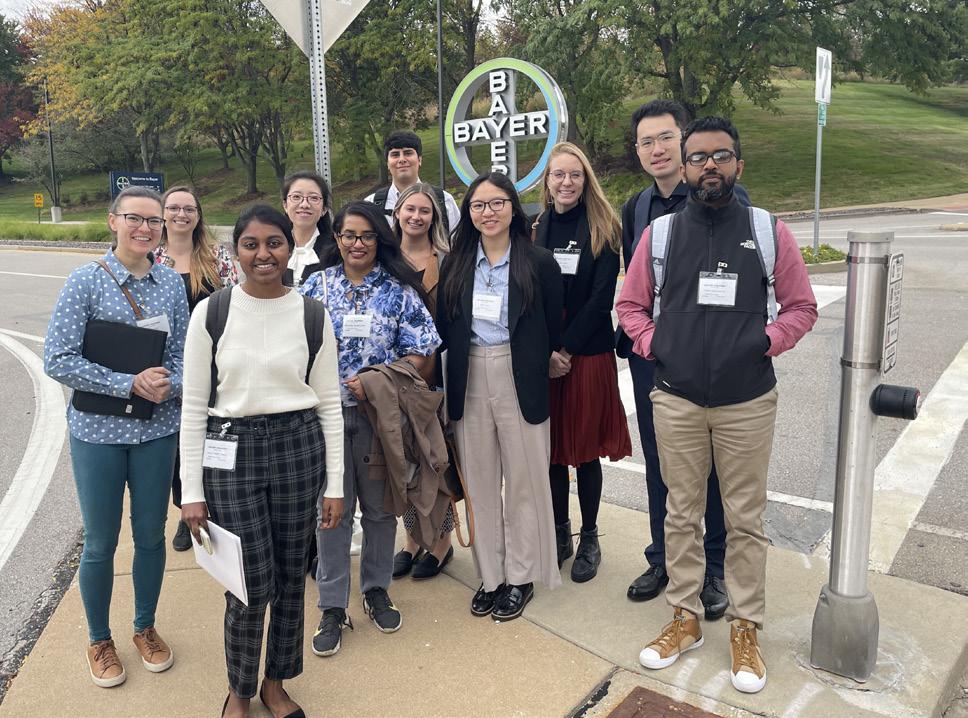
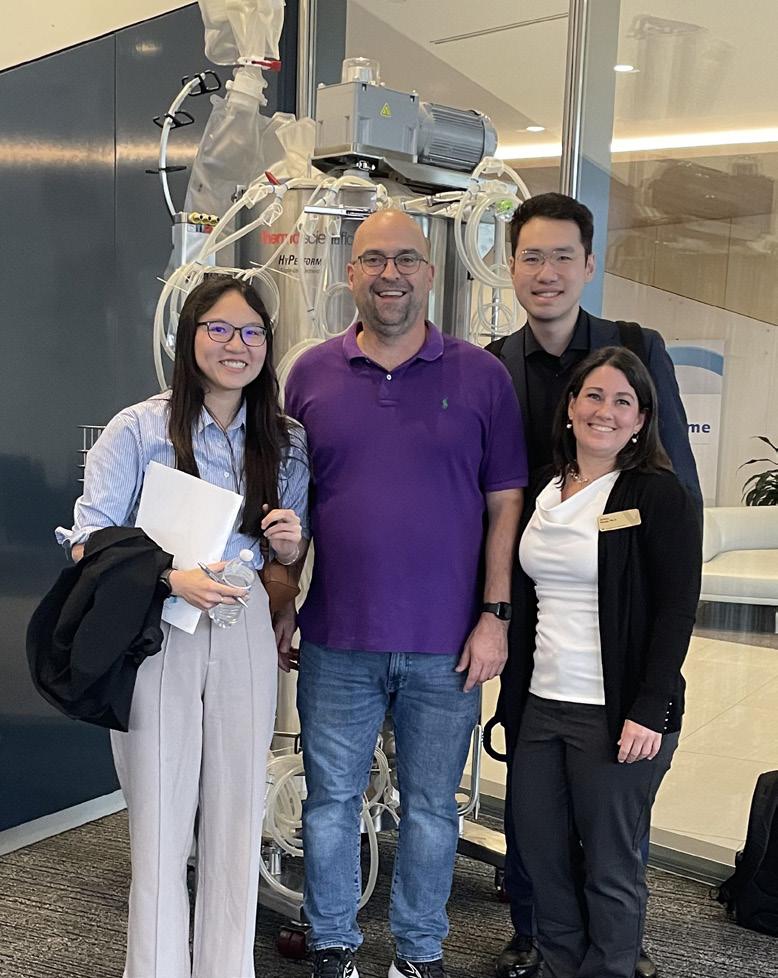
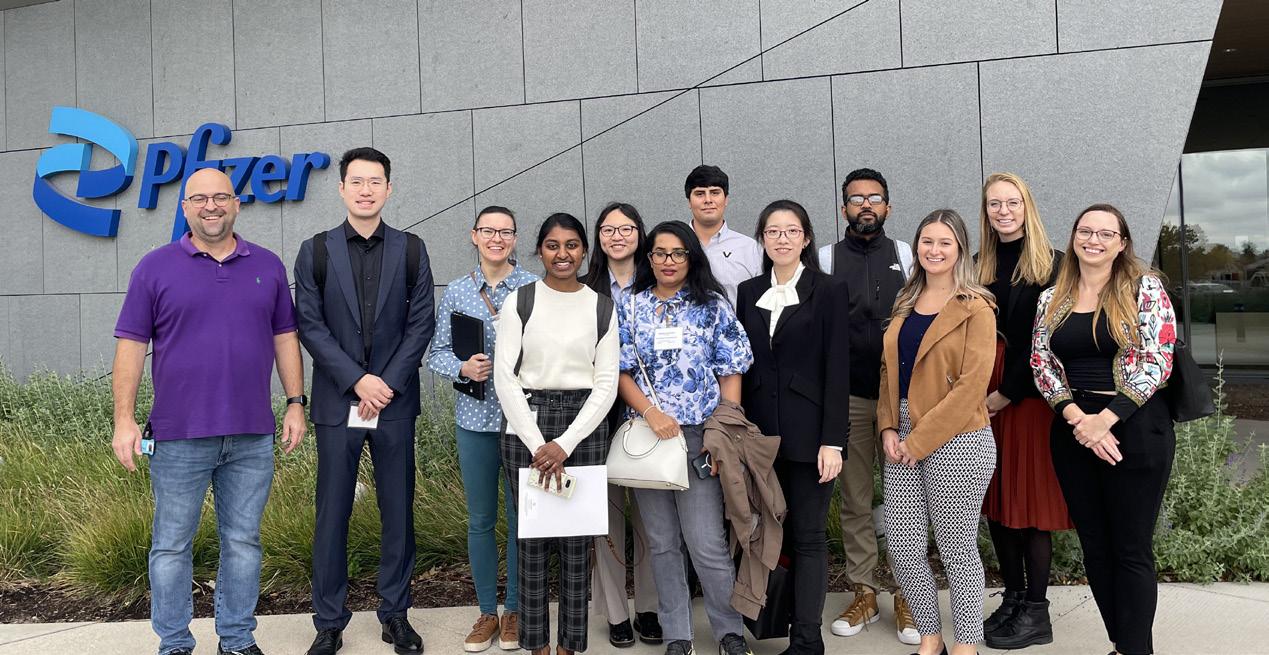


Skill-building, networking, negotiating, and managing a professional image are important aspects of a trainee’s professional development. Our workshops, seminars, modules, and informal cafés help equip trainees for the next step in their career path.
ASPIRE Modules fill in any training gap for career readiness a graduate student or postdoctoral fellow may have. The ASPIRE Modules are short, non-credit bearing electives that broaden the training experiences of biomedical sciences trainees. These elective modules provide efficient exposure to topics in major career theme areas. The ASPIRE Modules are optional and open to any biomedical sciences trainee who wishes to take them to supplement their research training.
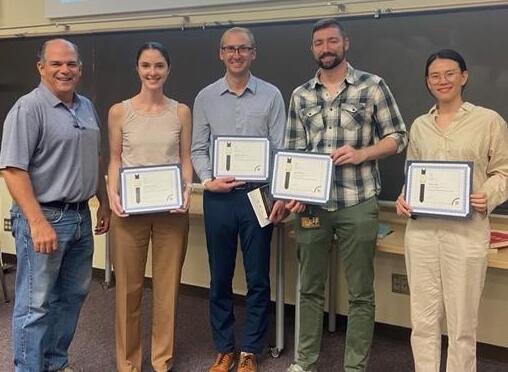




Faculty in teaching-intensive roles engage in a panel discussion about their jobs, from left to right, alumni Karen

This ASPIRE Workshop for Preparing for a Faculty Career and Job Search is for postdocs and late-stage grad students in the biomedical and life sciences who are interested in faculty careers. The full day event features interactive sessions and panel discussions with current faculty on topics ranging from exploring faculty roles, to interviewing for faculty jobs. Topics include:

Planning Your Independent Research Career
Applying and Interviewing for Faculty Jobs
Negotiating Your Faculty Position
International Faculty Panel
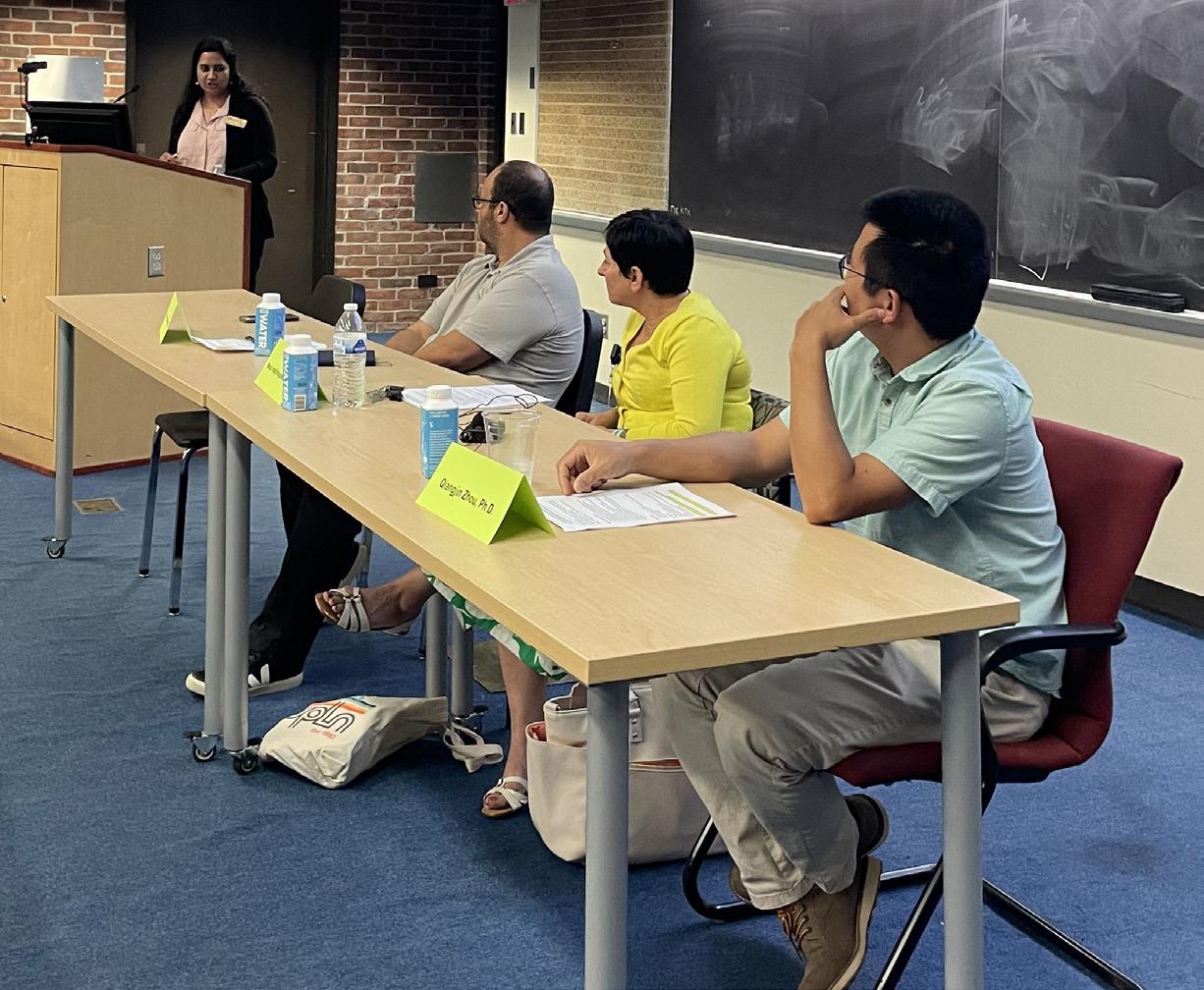



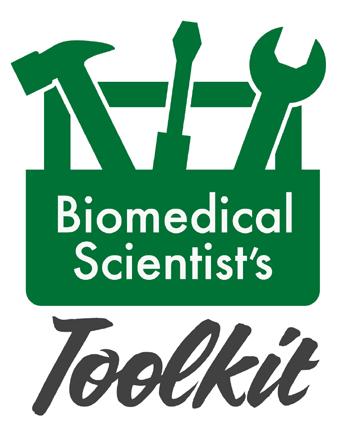

Ashley Brady covers Interviewing 101 during a monthly session of the ASPIRE Job Search Series.
The ASPIRE Job Search Series is a monthly career development workshop series for biomedical PhD students and postdoctoral scientists covering topics pertinent to preparing for and participating in the job search.
The ASPIRE Biomedical Scientist’s Toolkit is a career development workshop series focused on equipping biomedical PhD students and postdoctoral fellows with the skills and insight to achieve their highest potential during their research training and beyond.
The ASPIRE Cafe for Postdoctoral Fellows is a seminar series featuring career development and professionalism topics curated specifically to help postdoctoral fellows maximize their training and successfully transition to their next career stage.
The ASPIRE team maintains a repository of funded grant applications written by Vanderbilt graduate students. Access is granted to Vanderbilt graduate students who are currently writing a grant application. Currently the repository contains example F31 NIH NRSA, AHA, and NSF GRFP grant applications.
The ASPIRE Grant Repository has expanded to assist faculty who are writing NIH Diversity Supplement applications. Faculty members with a funded NIH diversity supplement are encouraged to share their applications as an example for future Vanderbilt faculty applicants.
152 Trainees accessed repository since Fall 2021
23 NSF GRFP examples

The ASPIRE Path in Molecular Medicine (APMM) is designed to provide advanced training in the field of molecular medicine, which bridges basic science with clinical application. The program is dedicated to educating the next generation of researchers and practitioners by integrating cutting-edge molecular techniques with clinical insights to enhance understanding and treatment of diseases.
Key Components of the Program
• Training and Education: APMM offers comprehensive training opportunities that include coursework, seminars, and hands-on research experiences. The curriculum equips students with a robust understanding of molecular mechanisms and their relevance to medical practice.
• Research Opportunities: Students in the program engage in research projects that explore the molecular basis of diseases and potential therapeutic strategies. The research is collaborative, involving both basic scientists and clinicians.



To participate, students must meet academic and research prerequisites. This includes foundational knowledge in molecular biology and relevant laboratory skills.
The program aims to foster a multidisciplinary approach, preparing trainees to contribute significantly to the field of molecular medicine through innovative research and clinical applications.
APMM Program alumni have pursued a diverse range of basic science, translational, or clinical research careers in academia, industry, government, and nonprofit sectors.
Above, at this year’s annual summer retreat, students showcased their research findings, participated in presentations at the anatomy lab, and had the privilege of hearing from keynote speaker Ben Park, Director of VUMC Precision Oncology. Left, APMM leadership presents certificates for students completing the program.

Mark de Caestecker, MB, PhD Program Director

Abigail Brown, PhD Co-Program Director

Rachelle Johnson, PhD Co-Program Director
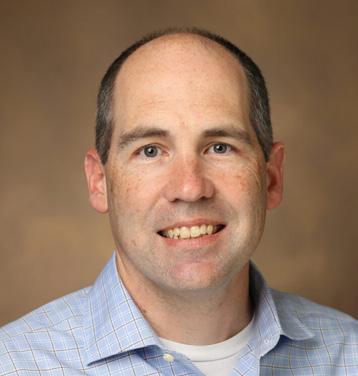
Matt Luther, PhD Co-Program Director

Christopher S. Wilson Program Assistant Director

Mary Gray Lindstrom Program Manager

The “Bench to Bedside” mini-symposium series was created to enhance interaction and discussion between Vanderbilt biomedical science graduate and postdoctoral education programs and clinical scientists involved in patient care.
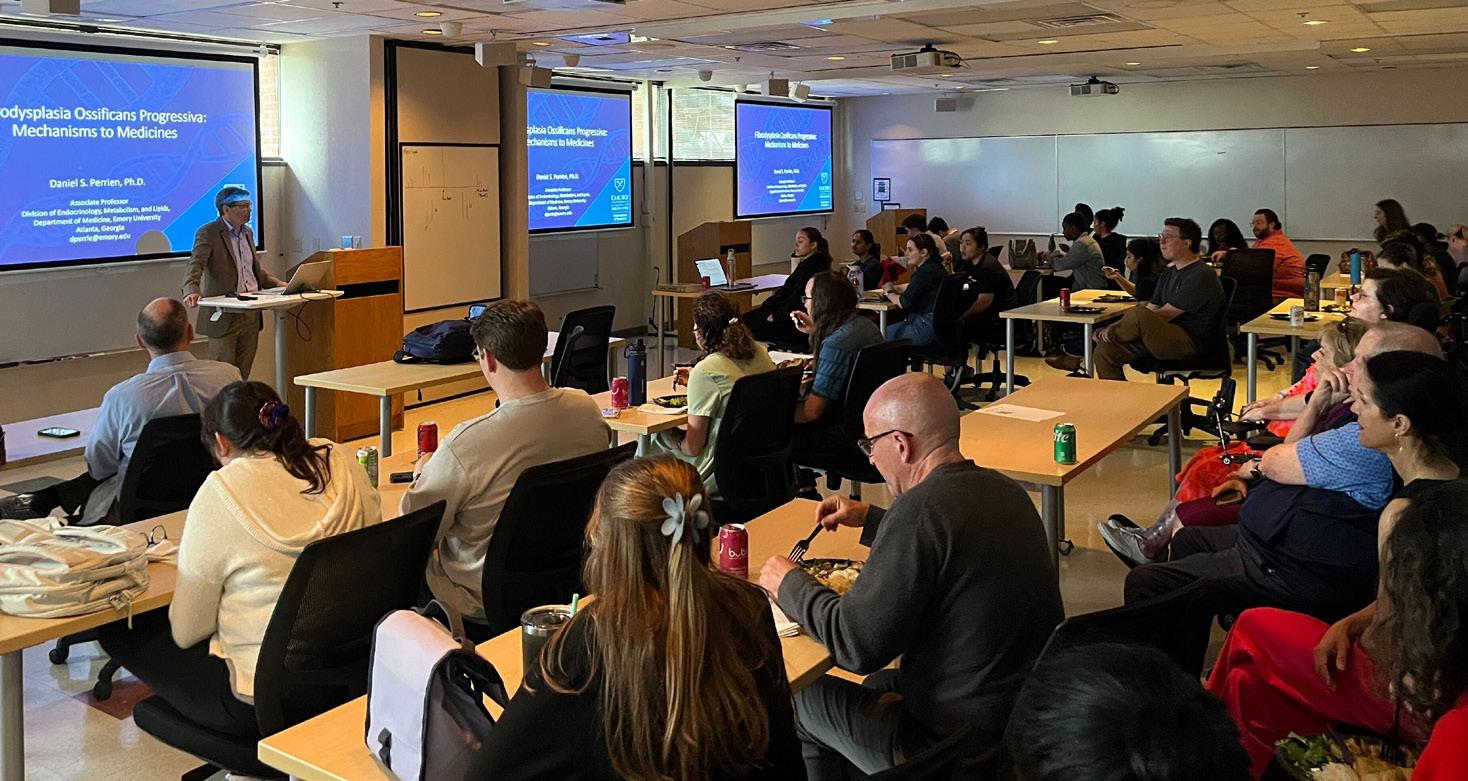
Dr. Daniel Perrien and Dr. Kathryn Dahir discussed fibrodysplasia ossificans progressiva (FOP). Dr. Perrien is an Associate Professor of Medicine at Emory. Dr. Dahir is a Professor of Medicine in the Division of Endocrinology and Metabolism at the Vanderbilt University Medical Center. Below, Keynote speaker Dr. Ben Park presented on “Found” in translation: Science driven by unmet clinical needs.


September 6 Fall Orientation
September 12
September 20
October 4
October 25
November 1
November 15
November 29
December 13
January 10
February 2
February 7
March 6
March 20
April 3
April 17:
April 24
May 1
May 15
May 22
June 28
Clinical Orientation
Welcome Reception
Speed Icebreaker Meeting
Bench to Bedside Symposium
Transthyretin Amyloid Cardiomyopathy
Emily Martin, PhD and Rebecca Hung, MD, PhD
Town Hall and Info Session
Bench to Bedside Symposium – VIVID Health
Multi-disciplinary gender-affirming care
Kevin Niswender, MD, PhD
Seminar Series – Health Dipartites in Kidney Disease
Ebele Umeukeje, MD, MPH
Bench to Bedside Symposium
Parkinson’s Disease and Deep Brain Stimulation
David Charles, MD and Mallory Hacker, PhD, MSCI
Clinical Quiz
Bench to Bedside Symposium –Immune Checkpoint Inhibitors in Cancer
Dr. Doug Johnson, MD
APMM Student Research Talk
Heather Hartmann and Amelia Cephas
APMM Student Research Talk
Tara Hickman
Bench to Bedside Symposium –Cystic Fibrosis: From Bench to Bedside
Allison Miller, MD and Dan Cook, MD, PhD
APMM Student Research Talk
Lindsay Bass
Bench to Bedside Symposium
New Therapeutic Approaches for Hypophosphatasia
Kathryn Dahir, MD
APMM Happy Hour
APMM Student Research Talk
Sudiksha Rathan Kumar
P. Brent Ferrell, MD
APMM Happy Hour
Summer Retreat


Bench to Bedside Symposium – Myelodysplastic Syndrome: Understanding a Failing Bone Marrow and its Risks

The BRET Office of Career Development strives to maintain partnerships with departments and programs across campus. We partner by providing presentations on a variety of professional and academic development topics and serving on university committees.

The ASPIRE Team serve in a variety of capacities to advise and partner with campus organizations, committees, and initiatives:
• Dean’s Advisory Council for Mental Health and Wellness
• Graduate Development Network
• Basic Sciences Council of Visitors
• Vestigo Editorial Board
• VU Science Policy Student Group Faculty Advisor
• Vanderbilt University Advanced Degree Consulting Club Staff Advisor
• Professional Development Course, “Becoming a Scientist,” IGP Curriculum Review Committee
• Life Science Tennessee Academic Alliance
• VU Corporate Partnerships Advisory Board
Vanderbilt School of Medicine Basic Sciences Dean’s Office
Vanderbilt University Medical Center
Vanderbilt Graduate School
Vanderbilt Career Center
Vanderbilt Center for Tech Transfer & Commercialization
Training Programs in the Biomedical & Biological Sciences
Vanderbilt Development & Alumni Relations
Vanderbilt Graduate Development Network
Vanderbilt Graduate Leadership Institute
Vanderbilt Institute for Infection, Immunology, & Inflammation (VI4)
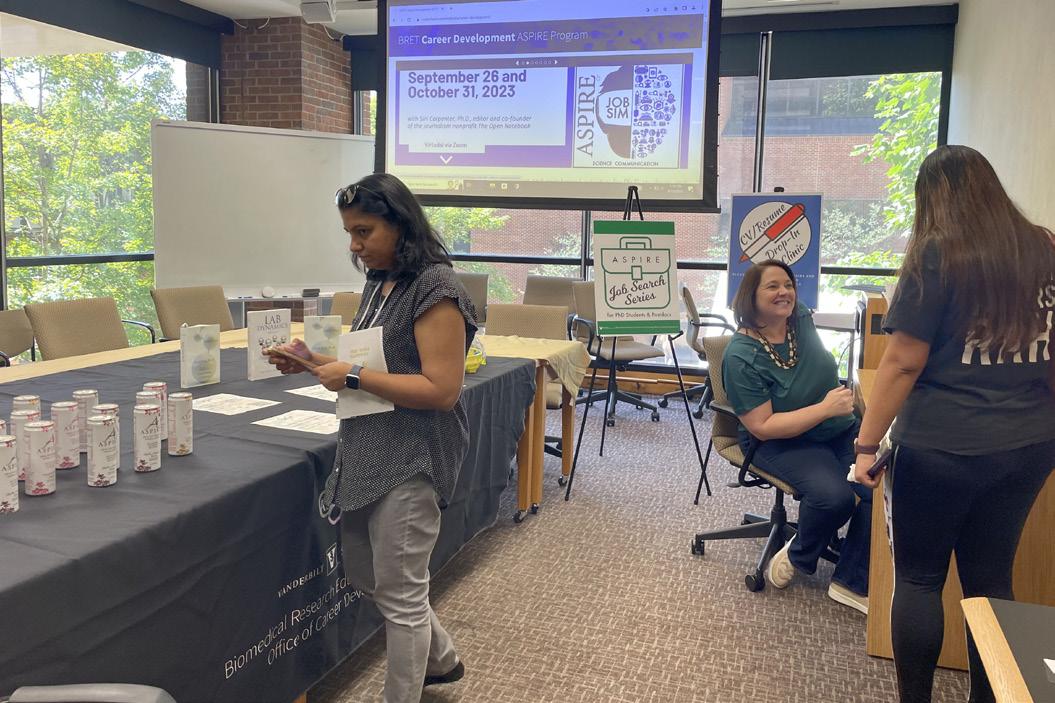
Vanderbilt International Student & Scholar Services
Vanderbilt Graduate Program in Chemistry
Vanderbilt Managerial Studies Program
Vanderbilt Medical Scientist Training Program
Vanderbilt Office of Federal Relations
Vanderbilt Office of Public Affairs
Vanderbilt Office of Postdoctoral Affairs
Vanderbilt Postdoctoral Association
Vanderbilt Process & Solution Implementations
Vanderbilt Research Cores & Shared Resources
Vanderbilt School of Engineering
Vanderbilt University Advanced Degree Consulting Club
Vanderbilt Science Policy Group
Vanderbilt University Counseling Center
The Vanderbilt Collaborative for STEM Education & Outreach (CSEO)
Vanderbilt Writing Studio
The Wond’ry


Career and professional development best practices and trends are constantly evolving. To continue to provide outstanding services and remain at the forefront of graduate and postdoctoral career development, the ASPIRE Program cultivates partnerships and participates in professional organizations to share our work.
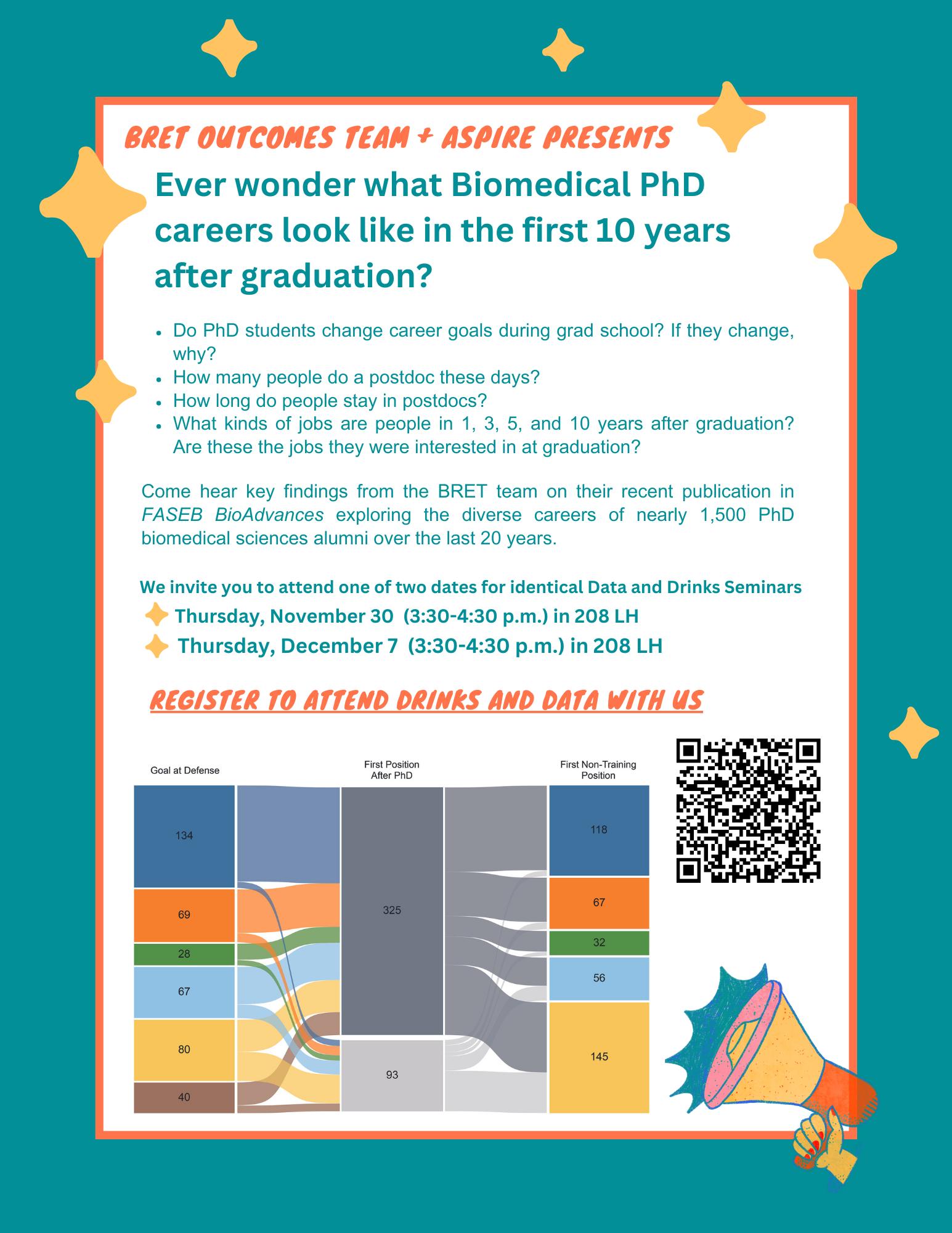
From Goal to Outcome: Analyzing the Progression of Biomedical Sciences PhD Careers in a Longitudinal Study using an Expanded Taxonomy
Authors: Abigail M. Brown, Lindsay C. Meyers, Janani Varadarajan, Nicholas J. Ward, JeanPhilippe Cartailler, Roger G. Chalkley, Kathleen L. Gould, Kimberly A. Petrie
Using a taxonomy that delineates key milestones, the study of the BRET Outcomes team analyzed biomedical PhD student career goals and outcomes. The group related career goal at defense with first position after PhD, first non-training position, and job at several timepoints after graduation. Students commonly changed career goals during training and entered first nontraining positions in different career areas than their goal at defense. The career area of graduates’ first non-training position was a good indicator of their job 10 years after graduation.
The Outcomes Team hosted Town Hall seminars to discuss the results with the BRET community.


Jan Varadarajan is the Co-Chair of the Finance Committee.
Kate Stuart is the Director of Southeast Region and Regional Conference Committee Chair.
Ashley Brady is a member of the Professional Development Committee.
Jan Varadarajan and Kim Petrie presented a concurrent talk at the 2024 Graduate Career Consortium Conference in Philadelphia. There, they presented on the recent FASEB paper findings of longitudinal alumni outcomes data.



Jan Varadarajan and Kate Stuart traveled to the 2024 National Postdoctoral Association meeting in March 2024. Both presented posters, and Kate Stuart was chosen to present a lightning talk, “A Tradition Worth Keeping: the ASPIRE Annual Career Symposium.”


Jan Varadarajan was selected to participate in the BWF Career Guidance for Trainees workshop which allowed award recipients extra training to accompany their grant funding to enhance training opportunities for graduate students and postdoctoral fellows around a specific career area.


Kim Petrie and Lindsay Meyers represented the BRET Office at the poster presentation session of the 2023 AAMC GREAT Conference.
Professional Development Activities for ASPIRE Staff
• Burroughs Wellcome Fund Career Guidance Project Development and Evaluation Workshop
• 2024 Graduate Career Consortium Annual Meeting
• 2024 Graduate Career Consortium Regional Meeting
• 2024 National Postdoctoral Association Annual Conference
• 2023 AAMC GREAT Group Annual Conference
• RedCap Day 2023


By Marissa Shapiro, Vanderbilt Basic Sciences

A team from the Office of Biomedical Research Education and Training published a longitudinal study of the career goals and outcomes of up to 1,452 biomedical sciences PhD graduates. The study provides clarity on how students’ career goals change during graduate school and how career goals at graduation connect to career outcomes.
The article, “From goal to outcome: Analyzing the progression of biomedical sciences PhD careers in a longitudinal study using an expanded taxonomy,” has broad implications for academic and biomedical research communities, funding organizations, employers and PhD trainees in the face of a changing workforce and economy. The article was published in the Federation of American Societies for Experimental Biology journal FASEB BioAdvances on October 5, 2023.
This research connects career goals during graduate school with career outcomes and shows the career evolution of PhD alumni longitudinally during the critical, career-defining 10 years after graduation with a PhD.
The job landscape for PhD graduates has changed
over the past decade, in part due to the country’s shift toward a knowledge-based economy. There are greater chances for people with advanced thinking, analysis and communication skills developed during their PhD studies to work for private companies in 2023 than in 2013. This shift is intensified by the stagnation or lessening of the number of permanent faculty positions in universities during this time. The result is that fewer PhD graduates are taking the traditional route of becoming professors in universities.
“This trend is especially true for biomedical science PhD graduates,” said Abigail Brown, first author of the article, director of outcomes research for BRET and assistant professor of molecular physiology and biophysics. “The number of PhD degrees granted by U.S. institutions has quadrupled in the last 40 years, while available tenure-track faculty jobs have remained steady.”
While there are numerous compelling career prospects for PhD scientists, little is known about the factors that influence their career choices. Equally lacking is data about career path progression and how it aligns with the aspirations of PhD students during their studies.
To address these gaps, the BRET team’s study followed the careers of 1,452 Vanderbilt biomedical PhD alumni

who graduated between 1997 and 2021, for up to 10 years after their thesis defense. Their work was guided by their goal of more closely aligning the structure of biomedical PhD training programs with career development initiatives for Vanderbilt trainees and with national workforce trends.
“We found that most students changed their career goals during graduate school, which speaks to the importance of universities and graduate programs providing opportunities for PhD students to explore career options and their interests,” said Kimberly Petrie, principal investigator on the study, assistant dean for biomedical career development for BRET and associate professor of medical education and administration. “Our findings emphasize that PhD students need a wide range of career development opportunities and career mentoring during graduate school to help them transition efficiently to their future careers inside and beyond academia.”
Other findings include:
• Overall, about 30 percent of students were interested in research-intensive faculty jobs at the time of doctoral defense.
• Students who became more interested in pursuing a faculty job during graduate school cited a high-quality mentoring experience or increased confidence in their ability to succeed.
• Many alumni ultimately pursued different careers than their stated career goal at the end of graduate school, suggesting that alumni also switch goals during postdoctoral training.
• By 10 years after graduation, about one third of alumni were in academic research positions. The remaining alumni were employed in other types of roles in academia, industry, government and nonprofits.
• In line with national trends in postdoctoral employment over time, there is a declining number of Ph.D. students pursuing postdoctoral training.
The article co-authors include Lindsay Meyers, Assistant Dean of BRET Operations, Janani Varadarajan, Assistant Director of Postdoc Support and Outcomes Research Project Manager, Nicholas Ward, former Outcomes Research Project Manager, Jean-Philippe Cartailler, Director of Creative Data Solutions in the Vanderbilt Center for Stem Cell Biology, Roger Chalkley, former Senior Associate Dean of BRET and professor emeritus of Molecular Physiology and Biophysics, and Kathleen L. Gould, Louise B. McGavock Professor of Cell and Developmental Biology and former Senior Associate Dean of BRET.
This work was supported in part by a Common Fund NIH Director’s Biomedical Research Workforce Innovation Broadening Experiences in Scientific Training Award (DP7OD018423).


ASPIRE partnerships with companies and organizations lead to exciting exploratory visits, internships, and externships for our trainees. Employer Relations and Workforce Development also includes:
• Meetings with potential and current employer partners
• Hosting employer information sessions
• Speaking at conferences and giving invited talks
• Serving on committees to represent Vanderbilt biomedical trainees
The ASPIRE Program facilitates opportunities for graduate students and postdoctoral fellows to conduct internships and gain hands-on experience with a project in a professional work environment. From remote work as a planner for a large national conference or a business development analyst for a local biotech company, the internship program offers experiential learning opportunities with depth and breadth.
Since the ASPIRE Program began in Fall 2015, 203 trainees (146 graduate students, 57 postdocs) have completed internships with 47 partner companies and non-profit hosts.

6th Floor Insights
Belmont University
BioCentury, Inc.
Digital Medicine Society
CSNK2A1 Foundation
Decode Health
Digital Medicine Society
Form Bio
Pendant Biosciences, Inc.
Sarnoff Cardiovascular Research Foundation
VI4, PMI, VUMC
Vanderbilt Institute of Clinical and Translational Research
Vanderbilt University School of Medicine Basic Sciences
Developing relationships with local and national companies keeps the ASPIRE pipeline flowing with talent and opportunities! Establishing these partnerships yields employer information sessions for biomedical sciences
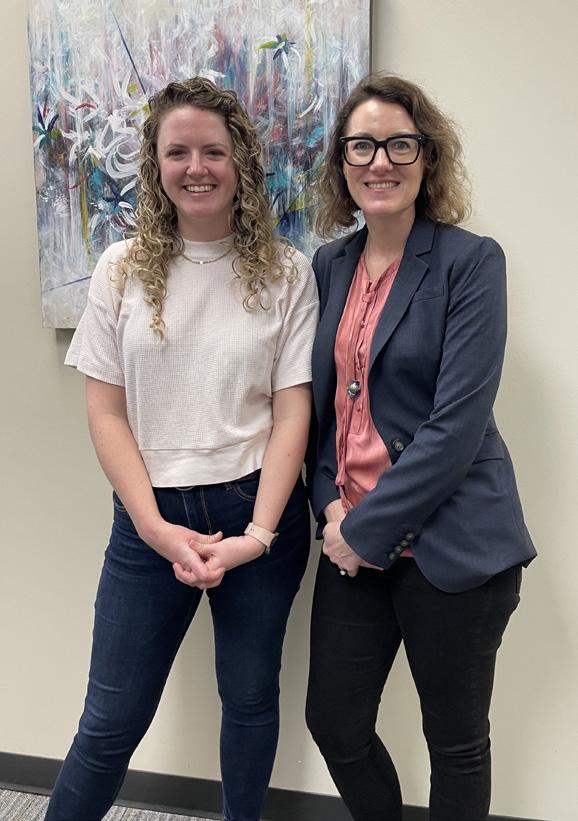

PhDs, conference meetups, internship opportunities, and other connections for the trainee population to embed into the scientific ecosystem.

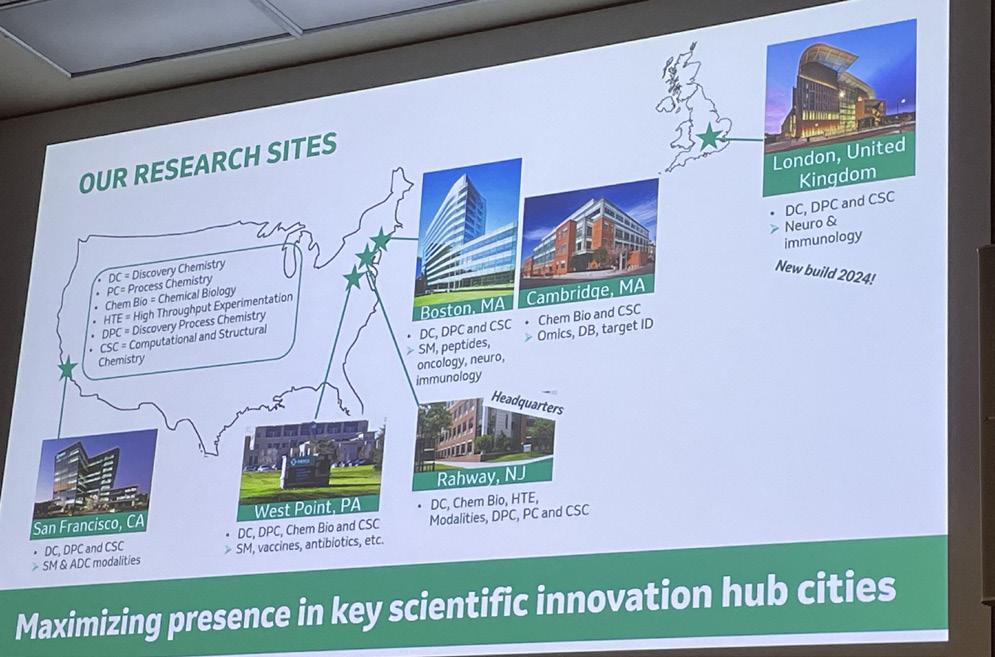

When they visit campus, employers meet with trainees and are exposed to the population we serve in-person. In turn, trainees learn what companies have to offer and develop personal connections that offer insight into a company’s culture and values. Trainees can also use the time to explore if a company is a good fit.


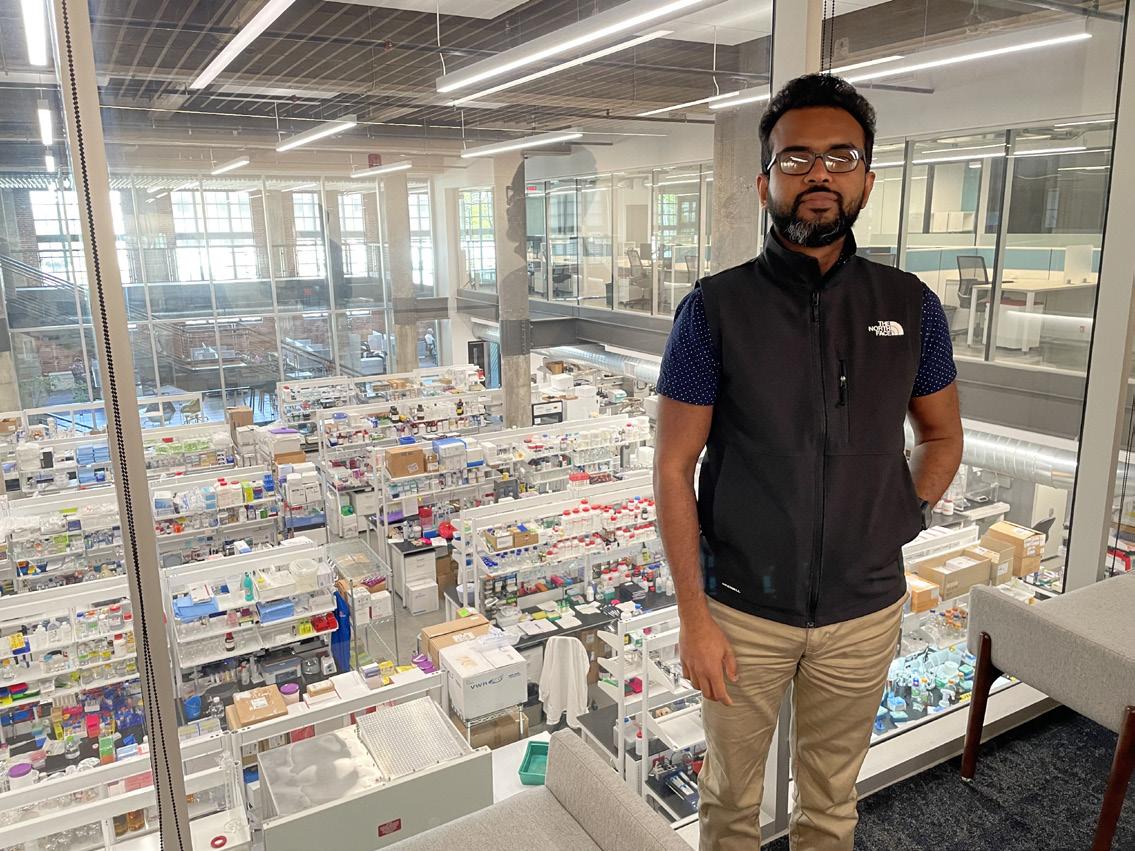
By Alexandra Scammell, Vanderbilt Basic Sciences
The School of Medicine Basic Sciences has seen remarkable and diverse trainees come through its doors, collaborate and learn from distinguished faculty, then graduate from one of our nationally ranked departments. But where are they now?
They go on to become leaders in basic science fields at notable institutions, universities, governmental entities, and research and development companies. Some of the places our alums have gone on to work are U.S. Department of Health and Human Services, St. Jude Children’s Research Hospital, Pfizer Inc., Food and Drug Administration, Oak Ridge National Laboratory, to name but a few. And some even decide to stay at Vanderbilt!
Meet Randika “Randy” Perera, Fellow’24, who worked in the lab of Walter Chazin and is now a scientist at the pharmaceutical and biotech company MilliporeSigma. His work is focused on antibody drug conjugate-based drugs as a targeted therapy for treating cancer.
We sat down with Perera to discuss his experiences studying basic science and how it played a role in his successful career.
What activities at Vanderbilt had the most significant impact on your career path?
The ASPIRE Program profoundly shaped my professional growth by offering a rich array of resources and opportunities, such as career workshops, mentorship, and networking events. The ASPIRE on the Road trips especially were transformative, allowing me to explore various industries, connect with professionals, and gain valuable insights into different career paths. The program’s emphasis on real-world applications and career readiness equipped me with the skills and knowledge necessary to navigate my career journey effectively.
Dr. Perera is shown here at BioSTL, an entrepreneur center and incubator in St. Louis, looking down on their lab space during his ASPIRE on the Road trip to St. Louis.
My ASPIRE on the Road experience in St. Louis was truly instrumental for my career. The program provided an incredible opportunity to explore the vibrant biotech and pharmaceutical landscape of the city. During the trip we took in October 2023, we visited several cutting-edge companies and research institutions, including MilliporeSigma, which allowed us to gain valuable insights into industry practices and network with industry experts.
Additionally, my involvement in the Wond’ry, Vanderbilt’s Innovation Center, particularly with the Sullivan Family Ideator Program, was pivotal. It taught me how to translate scientific knowledge into viable business ideas and consider the broader impact of commercializing academic research. This experience provided invaluable insights into the business aspects of science and prepared me for the dynamic world of pharmaceutical industry.
One of the greatest strengths of Vanderbilt is its ability to bring together like-minded, goal-oriented individuals who fostered my confidence and enabled me to achieve more than I had imagined.
Tell us more about your ASPIRE on the Road trip to St. Louis!
One of the highlights of the trip was the Q&A sessions, where we had the opportunity to connect with industry professionals. During MilliporeSigma’s Q&A, one of the panelists mentioned that, when preparing a resume, we should not only focus on our career achievements but also highlight how our experiences align with the job requirements and the company’s needs. This was a great eye-opener for me and greatly influenced how I prepared my resume.
During my interview process with MilliporeSigma, I was able to mention that I had visited one of their sites and named the panelists I had spoken with. This led to an engaging
conversation about the different MilliporeSigma sites in St. Louis, and eventually resulted in a job offer.
The ASPIRE on the Road trip not only expanded my professional network but also showcased the importance of seizing opportunities and being proactive in career development. It was a remarkable experience that significantly influenced my career trajectory.
Were there any specific mentors or professors who played a crucial role in shaping your career aspirations?
Walter Chazin, who was my postdoc advisor, was one of the best mentors I have encountered during my career. When I first joined his lab, I mentioned my aspiration to join the biotech or pharmaceutical industries after my postdoc period. Drawing from his extensive experience, he helped me curate my career and personal development goals to enhance my competitiveness for industry positions. He was approachable and available, creating a comfortable environment for me to seek advice and ask questions.
Dr. Chazin provided me and my peers with honest, constructive feedback. He pointed out areas for improvement in a supportive manner, aimed at fostering both professional and personal development. His strong work ethic greatly influenced me, instilling a sense of dedication and discipline that has been invaluable in my career. He had a strong professional network and was generous in sharing connections, resources, and opportunities with me. Most importantly, he was empathetic to my challenges and perspectives, always encouraging me to see the bigger picture.
The other mentor who had a significant impact on my career was Andy Weiss, who was a postdoctoral scholar in Eric Skaar’s lab at the time. Andy was my first collaborator, and we worked closely together on several research projects, producing high-quality science. He was instrumental in guiding me through the transition from academia to industry. Andy generously shared his experiences and insights, demystifying the process and helping me understand what to expect in the industry. His support extended beyond professional advice as he was also a great source of personal encouragement, reminding me to stay resilient and focused on my goals.
Can you share a pivotal moment or decision in your career?
Taking part in the ASPIRE on the Road program played a pivotal role in my career because I was at a crossroads at that time, debating whether to stay in academia or transition to industry. I hadn’t visited any pharmaceutical companies before, so I wanted to get some firsthand experience before
making my decision. Seeing the high-tech pharmaceutical companies and getting a glimpse of their culture by connecting with their employees gave me the perspective I needed. It confirmed my goal to join the industry, and from then on, I’ve never looked back.
How has the interdisciplinary nature of biomedical research training played a role in your ability to collaborate with professionals from different fields in your career?
During my time at Vanderbilt, I collaborated with research groups both within and outside the university, an experience that was invaluable in equipping me with skills to navigate diverse perspectives and manage conflict resolution, communicate effectively, and build strong relationships— skills crucial in the collaborative environment of the pharmaceutical industry.
Working with interdisciplinary teams and on complex research projects honed my problem-solving skills and adaptability. This experience proved invaluable during the interview process, where I could provide real-life examples of how I tackled challenges and contributed to successful outcomes in a collaborative environment.
Looking back, is there any advice you would give to yourself or current biomedical science students based on your own experiences and the lessons you have learned in your career?
Don’t hesitate to explore diverse opportunities and keep learning, even if they take you out of your comfort zone. The field of biomedical science is rapidly evolving, and ongoing learning is essential to stay current and competitive. Even if some techniques or instruments are not directly related to your research, still try to become familiar with them. Vanderbilt has great resources for biomedical students. Each experience, whether successful or challenging, contributes to your growth and broadens your perspective.
Maintain good relationships with your peers and don’t be afraid to ask questions. Networking opens doors to collaboration, mentorship, and potential career opportunities. Since we are in the biomedical field, it is important to stay resilient. Some days, you might not obtain the results you want, or the experiments may fail, but view these as opportunities to learn, adapt, and grow stronger. Finally, celebrate your successes, acknowledge your achievements and hard work, both big and small. Try a new restaurant in downtown Nashville or go watch a football game on Sunday with your friends. Taking care of your physical and mental well-being enhances productivity, boosts confidence, and motivates you for your future endeavors.


By Ximena Leon, PhD Candidate
My entire academic journey has been one of discovery— trying to make a clearer path towards a future career in STEM. But what does that look like when you are a graduate student with a plethora of career possibilities but none that seem to fit the parts of STEM that you are most passionate about?
Now a 4th year PhD student, the anxiety of figuring out
what I want to do with my degree is finally setting in. I have started looking into potential careers that both fit my skillset and incorporate aspects of my training that provide me with the most fulfillment. For me, what I enjoyed the most about science was the outreach and mentorship opportunities that evolved from my research experiences. Since starting college, I have focused on using my science background to connect students with STEM opportunities early in their academic journeys. However, I had no idea where to start with making this into a career! What would this career interest look like
outside of academia post-graduation? While on LinkedIn, I came across a post about the Science Events Summit—a gathering of individuals passionate about connecting people with science in their communities. What better way to explore a career in science outreach than by meeting the people who are actively involved in it?
Through support from the Science Events team and the BRET Office of Career Development ASPIRE Travel Scholarship Program, I was able to attend the Science Events Summit at the Petersen Automotive Museum in Los Angeles, California this past June. Immediately upon arriving at the summit, I was greeted by friendly faces eager to talk about science events. The conference was structured with several roundtables, panel discussions, opportunities for oneon-one conversations, plenary talks, and a science events expo. The small size of the conference gave me the chance to meet every single attendee and prompted incredibly valuable and inspirational conversations.
I had the opportunity to co-lead one of the roundtable discussions with Francesca Long (Wisconsin Science Festival) on developing careers in science outreach. The roundtable discussion focused on topics from career trajectories, job titles, and how to leverage your skills to find a job in science outreach. This intimate group conversation allowed us to receive advice and raw perspectives about what it looks like to be in the field of science outreach, specifically two key things: 1) every career trajectory looks completely different and doesn’t have to be linear and 2) your technical skills aren’t the only things you bring to the table as a graduate student. Every individual sitting at the table had completely different paths— some had picked up jobs in science events after retiring from their previous jobs as professors and entrepreneurs, others discovered years into their industry jobs that their passion was in science communication, and some even started in event organization and found their way into science events. However, none of them had anticipated the career shifts that they would be making along the way. I also learned that years of experience in one career can lead to many transferable skills, and those around the table shared how they were able to leverage those skills and combine their passions to create a career in science events. Similarly, I realized that though the research skills we learn during graduate school may not be directly related to the career we envision having, we develop other skills, such as leadership and communication skills, that are valuable to jobs outside of research. All you may need is a creative way to market yourself and the skills to back it up.
My conference experience could be summarized by final plenary talk speaker and founder of Pueblo consulting company, Daniel Aguirre, who advised to, “listen for an opportunity.” This really stuck with me as it encapsulates everything I learned at the summit—opportunities are everywhere. Networking is so important, and actively listening to the community of people that you are serving and collaborating with is crucial to a successful and meaningful career in science outreach.
I walked away from the summit with new friendships, opportunities for collaboration, and incredible career mentors. I encourage you to explore your passions because it may lead to a clear vision of what you want your future career to look like as well as a network of people that can help you reach your goals.


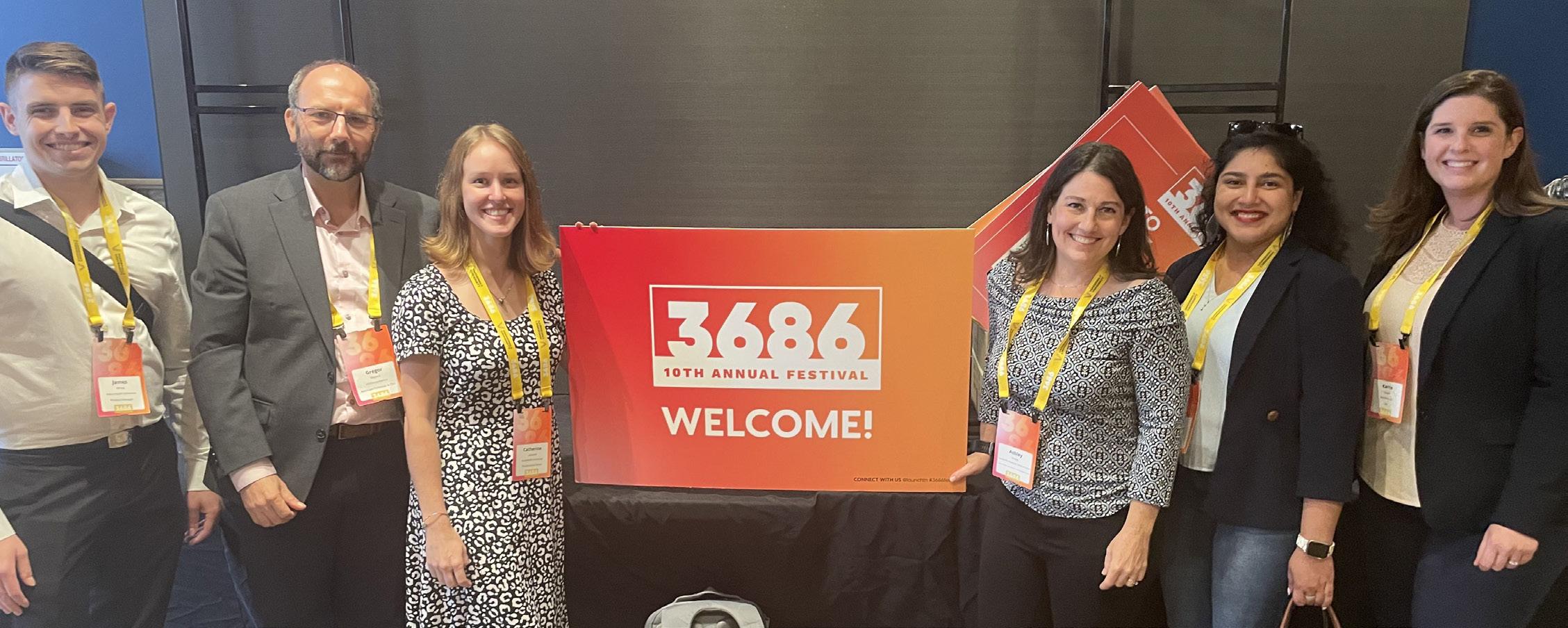
By Ashley Brady, PhD
Catherine Leasure, PhD’23, has been awarded the prestigious ASPIRE to Innovate Postdoctoral Fellowship. In her new role, which began on July 1, 2023, she is focusing on forming a start-up company based on technology developed at Vanderbilt University by Gregor Neuert, associate professor of molecular physiology and biophysics, that can model the pharmacodynamic profile of drugs.
The ASPIRE to Innovate Postdoctoral Fellowship is a collaborative initiative of the School of Medicine Basic Sciences, the BRET Office of Career Development’s ASPIRE Program, and the Center for Technology Transfer and Commercialization that seeks to bridge the gap between academic excellence and entrepreneurial pursuits. Leasure will be supported in her efforts for up to two years, will receive extensive mentorship and supplemental training, and will participate in a variety of networking opportunities. Leasure is the second person to participate in this fellowship, following Karrie Dudek, PhD’21, who inaugurated the program in 2021.
Leasure completed her PhD training in Vanderbilt’s Microbe-Host Interactions program this past spring, studying heme homeostasis in Staphylococcus aureus and host stress sensing in Bacillus anthracis. While gaining experience in research and scientific methodology, she has been passionate about applying these skills to projects at the
intersection of science and business and is excited about the opportunity to grow her business acumen and strategize how to turn an idea into a company.
“It’s an honor to have been selected for this fellowship and to have the opportunity to translate basic science into realworld solutions,” Leasure said. “I am excited to have been given this protected time as a postdoc to develop myself as a businesswoman while working to build a viable company.”
During her time as a graduate student, Leasure took advantage of numerous opportunities to expand her experiences and understanding of business and entrepreneurship. She finished the ASPIRE Program’s Management and Business Principles for Scientists module, served as president of the Graduate Student Association in the Department of Pathology, Microbiology and Immunology, and acquired hands-on experience in the pharmaceutical industry by completing a three month internship in the Microbial Science division at AstraZeneca. Leasure hit the ground running, working alongside staff at the CTTC to learn about intellectual property rights, licensing, and market research. She is also spending time with Neuert and his research team to gain familiarity with the technology they want to commercialize. This past fall, Leasure participated in the Ideator program at the Wond’ry and secured microgrant funding after pitching her business idea to a panel of judges. This accomplishment made her eligible to apply for the National Science Foundation’s
National I-CORPS program, additional entrepreneurial training, and a $50,000 non-dilutive grant to help support further commercialization of the technology. Leasure was accepted into the program and will participate both in I-CORPS and in the Wond’ry’s Builder program this spring.
Final deliverables for ASPIRE to Innovate Postdoctoral Fellows include creating a market research and customer discovery presentation, developing a business plan and financial model, building a pitch deck for speaking to investors and delivering it at various business pitch competitions, and submitting applications for a Launch Tennessee microgrant and a Small Business Innovation Research grant from the National Institutes of Health to secure future funding. “The ASPIRE to Innovate Postdoctoral Fellowship has been an incredible experience and opened more doors than I could have ever thought possible,” Dudek said. “I am excited for Catherine to have a similar opportunity and can’t wait to see her be successful.”
“We all know that starting a company is a high-risk endeavor, but regardless of whether a viable company is ultimately formed, this fellowship is a win-win situation, both for the biomedical postdoctoral fellow, who gets superb entrepreneurial training, and the Vanderbilt research community, which benefits from the dedicated effort of evaluating a potentially commercially viable new technology,” Gould said. “We are grateful to Dean John Kuriyan of the School of Medicine Basic Sciences for his support in continuing this exciting initiative, as well as the CTTC, the Wond’ry, and Drs. Neuert and Ethan Lippmann, Karrie’s partner during her fellowship, for their contributions to training and mentoring of the fellows in the program.”
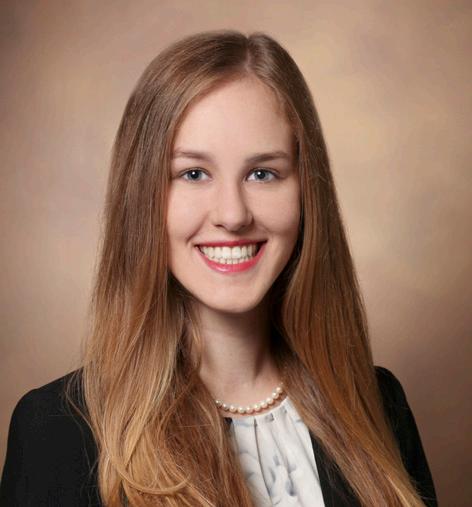




By Dora Obodo, Graduate Student
The Office of Biomedical Research Education and Training’s Career Development ASPIRE Program has been hosting an internship program for graduate students and postdoctoral fellows for eight years. The internship program, an invaluable resource for trainees interested in non-academic roles in the biomedical industry, has facilitated just over 200 internships to date through partnerships with a wide range of organizations.
In particular, the ASPIRE data science internship with Decode Health demonstrates how students can break into growing fields. Decode Health is a health care artificial intelligence company that empowers pharmaceutical companies and their tech partners by delivering proactive health care innovations to advance precision medicine.
Decode Health co-founder and CEO Chase Spurlock, PhD’14, takes a hands-on approach to training by integrating interns throughout the company’s operations, ensuring that they develop in areas aligned with their interests.
“Interns have the opportunity to touch every aspect of the company,” said Spurlock, whose degree is in microbe-host interactions. “We’re very intentional about having people join us who are interested not only in being on the data team, but also seeing how Decode’s products and services come together.”
Since 2018, the Decode Health team has hosted nine successful interns, several of whom continued to pursue data science roles afterwards.
“Industry is a completely different work environment than academia because people think about and prioritize different things here,” said Darwin Fu, PhD’17, currently a data scientist at Bluesight, a medication intelligence and software company. “Seeing that during an internship really
softens the transition.”
Like many of his biomedical scientist colleagues, Aaron May-Zhang, Fellow’20, senior bioinformatics scientist at Fluent BioSciences Inc., was interested in data science but had little experience during his postdoctoral training at Vanderbilt.
“My internship experience allowed me to be an attractive candidate to Fluent Biosciences because their day-today roles were similar to what I was experiencing in my internship,” he said. “I was able to point to specific outcomes and efforts that were highly relevant skills to the company.”
During the internship, students work on self-driven projects that can develop into pipelines to help advance customer goals. Students with highly successful projects can take on advanced responsibilities as their skills improve. Cody Heiser, PhD’23, a recent graduate from the Chemical and Physical Biology program who interned at Decode Health for a year and a half, progressed from a data analyst role into data engineering. “I got to wear a lot of different hats along the R&D spectrum in a dynamic environment where everybody has to contribute on so many different levels. The internship gave me experiences to point to and say, ‘Here are the challenges that I’ve seen in an industry space, and this is how I contributed to overcome those challenges,’” he said. Heiser is now a senior scientist at Regeneron.
For Spurlock and the Decode Health team, the ASPIRE partnership has also been incredibly rewarding. Not only do the internships provide bright, talented self- starters to the company, but they also afford trainees with necessary experiences to boost their competitiveness and foster industry- academia connections.

A Zoom meeting featuring Chase Spurlock, Jamieson Gray, and Lukasz Wylezinski on the top row, Tim Scott, Cody Heiser, and Sarah Groves on the middle row, and Verda Agan on the bottom. Spurlock and Lukasz are both with Decode Health while others are interns.


The Council of Visitors of the Vanderbilt Basic Sciences is a group of esteemed scientists who are accomplished in their field and advise the School with their knowledge of science efforts globally. Many members of the Council of Visitors are alumni and all have great esteem for Vanderbilt and for the trainees of the University.
The Office of Career Development continues to engage with biomedical PhD and postdoctoral trainees even after they complete their training. Alumni volunteer their time at career exploration and professional development events, host interns, facilitate site visits at their workplace, and mentor current trainees. The alumni network helps the office better understand career outcomes, informs career programming, and shapes the trajectories to current trainees.

When the Council meets twice annually, the lunch hour is designated for mingling, lunching, and networking with current graduate students and postdocs. Selected trainees meet global movers and shakers while sharing the common interest of scientific training at Vanderbilt.

Alumni and current trainees mix and mingle at

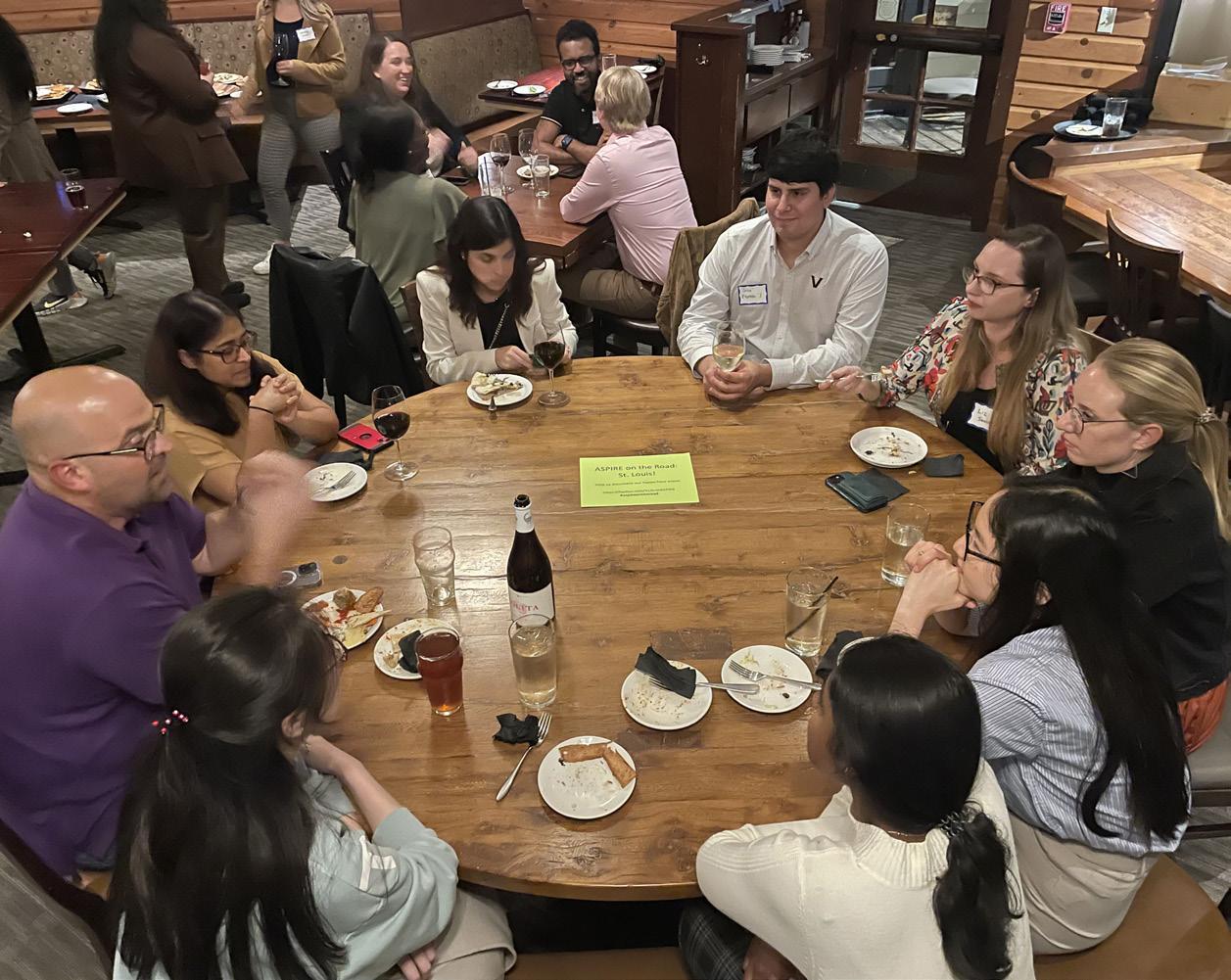

Now a tradition for ASPIRE on the Road trips, alumni gather to meet and greet the trainees visiting their city! This year’s Fall 2023 trip to St. Louis and the Spring 2024 visit to Boston created not one, but two, memorable Alumni Networking Happy Hours. Many alumni in attendance were graduates of the last decade with many participating in previous ASPIRE on the Road trips when they were trainees! Current trainees enjoyed the laid back opportunity to mingle in person with alumni, while alumni, administrators, and staff in attendance spent time recalling memories and exchanging stories.







Above, former participants of the ASPIRE on the Road: Boston trip visit with ASPIRE Program’s Ashley Brady and alumnus Evan Lebois. Left, Vanderbilt Basic Sciences Dean John Kuriyan converses with Boston alumni. Top left, alumni in Boston welcome current trainees and visit with former colleagues. Below, Vanderbilt Basic Sciences Council of Visitors member Asit Parikh chats with current trainee Perry Wasdin.

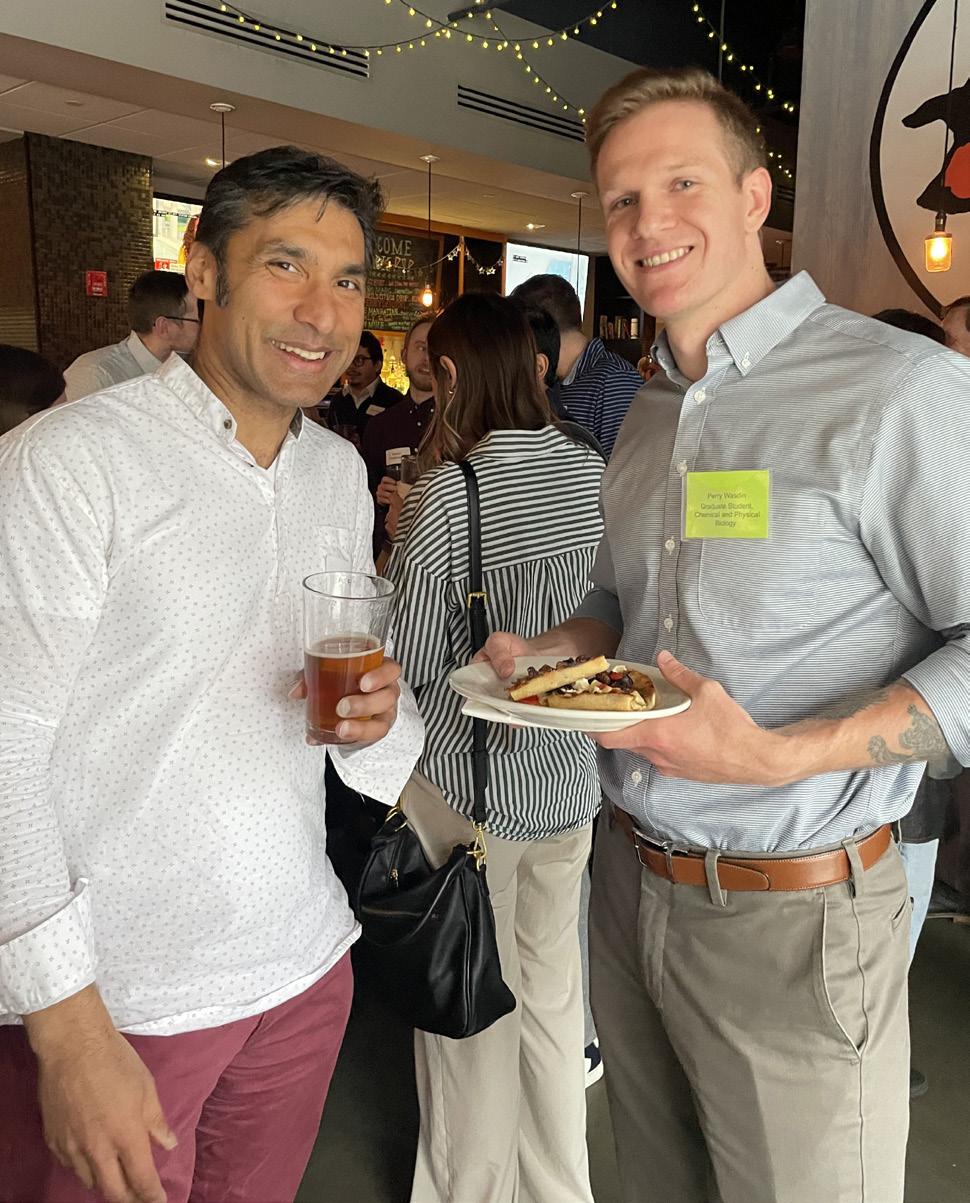
Janice Ascano, PhD, Research Development and Support, Vanderbilt University
Phil Ko, PhD, Research Development and Support, Vanderbilt University
Courtney Copeland, PhD, Senior Consultant, Strategy and Analytics, Deloitte Consulting LLP
Chastity Bradley, PhD, Founder and President, BioMed Writers, LLC
Emily Wooward, PhD, Director, Customer Engagement, Synchrogenix
Salma Cruz, PhD, Research Scientist, Vertex Pharmaceuticals
Tyler Perfitt, PhD, Scientist, Atalanta Therapeutics
Francis Prael, PhD, Scientist, Cheminformatics/AI/MLScientist, Cheminformatics/AI/ML, Bristol Myers Squibb
Tiffany Guess, PhD, DABMGG, Director Clinical, Molecular Pathology Laboratory Network, Inc.
Nicole Putnam, PhD, D(ABMM), Assistant Professor of Pathology, Assistant Director of Clinical Microbiology, University of Maryland Medical Center March 1,
Aaron Chaloner, JD, PhD, Associate, Baker Donelson
Seth Ogden, JD, PhD, Shareholder, Patterson Intellectual Property Law
6,
March 19,
Ph.D., Product Manager, Form Bio
Jacob Brown, PhD, Product Development Scientist, Mars
Ballrooms
9:10am10:15am
10:25am11:20am
Welcome & Opening Keynote: Critical Thinking for a Successful Career (and a Successful Life) Jean-Luc Doumont
Medical Science Liaison Panel
Keely Gilroy, PhD
Henry Henderson, PhD
11:30amnoon Government, Policy, and Advoacy
Amrita Banerjee, PhD
12:15pm1:15pm
1:25pm2:25pm
Lunctime Keynote: Clinical Laboratory Medicine
Karissa Culbreath, PhD
Industry Science
Eric Johnson, PhD
Jessica Overstreet, PhD
2:35pm3:30pm Writing and Publishing
Tony Chen, PhD
Emily Turner, PhD
3:30pm Networking Reception
Board of Trust Room Downstairs Classrooms 1&2
Government and Nonprofit Research
Kristin Burnum-Johnson, PhD Meagan Quinlan, PhD
Biotech Ventures
Isaac Zike, PhD
“Networking for Researchers” Jean-Luc Doumont
“Networking for Researchers” Jean-Luc Doumont
Date
November 13, 2023 Industry Scientist
November 21, 2023 Faculty and an Academic Spinoff
November 28, 2023 Postdoctoral Affairs and Advocacy
December 5, 2023 Entrepreneurship
December 12, 2023 Co-Founding a Startup
December 19, 2023 Industry Scientist
January 2, 2024 BioTherapeutics Scientist
January 10, 2024 Business Development in Industry
February 13, 2024 Product Development
February 23, 2024 Regional Medical Scientific Director
March 5, 2024
Fireside Chat: Jessica Overstreet, PhD (10:45am-11:15am)
Fireside Chat: Henry Henderson, PhD (11:30-noon)
Fireside Chat: Keely Gilroy, PhD (1:20pm-1:50pm)
Fireside Chat: Karissa Culbreath, PhD (2:00pm-2:30pm)
Fireside Chat: Kristin Burnum-Johnson, PhD (2:40pm-3:10pm)
Senior Grants Officer and Consultant
March 11, 2024 Scientific Communication
April 23, 2024 Product Management and Entrepreneurship
Dave Westover, PhD
Kristi Thiel, PhD
Chris Smith, PhD
Martin Moore, PhD
Amicia Elliott, PhD A3
Wyatt McDonnell, PhD
Bojana Jovanovich, PhD
Leolene Jean Carrington, PhD
Jeff Bylund, PhD
Jacob Brown, PhD
Todd Townsend, PhD
Lindsay Redman Rivera, PhD
Justine Sinnaeve, PhD
August 4, August 7, 2023
September 26, 2023
October 6, 2023
February 23, 2024 Headshot Day for Postdoctoral Fellows
March 28, 2024 Spilling the Tea with Biopharma Recruiters
Jeff Caskey, Founder, Nexagen Search Eric Celidonio, Founder & Managing Partner, Sci.bio Recruiting April 28,
Sr. Scientist,
Internship Host Number of Trainees and Internship Roles
Belmont University 2 Teaching Interns
CSNK2A1 Foundation
1 Data Analysis and Publication Intern, 1 Research and Development Intern, 1 Science Communication Intern
Digital Medicine Society 1 Research Associate Intern
Form Bio 1 Documentation and Education Intern
Pendant Biosciences 1 Business Development Intern
Sarnoff Cardiovascular Research Foundation 1 Scientific Program Intern
VI4, PMI, Vanderbilt University Medical Center 2 Science Communication Interns
Vanderbilt Institute for Clinical and Translational Research (VICTR) 1 Drug Repurposing and Scientific Project Management Intern
October 19, 2023
on the Road: St. Louis
April 30, 2024 ASPIRE on the Road: Boston
“Criticism builds against PhD careers firm Cheeky Scientist,” Science Careers, Kim Petrie, PhD, quoted, September 13, 2023
“‘These are not alternative careers’: More neuroscience Ph.D. programs start to facilitate industry internships The opportunities cater to students interested in careers outside the ivory tower.” Transmitter, Ashley Brady, PhD, quoted, April 29 2024
Brown AM, Meyers LC*, Varadarajan J*, Ward NJ, Cartailler JP, Chalkley RG, Gould KL, Petrie KA. From goal to outcome: Analyzing the progression of biomedical sciences PhD careers in a longitudinal study using an expanded taxonomy. FASEB Bioadv. 2023 Oct 5;5(11):427-452. doi: 10.1096/fba.2023-00072. *Authors contributed-equally
September 29, 2023
“From goal to outcome: analyzing the progression of biomedical sciences PhD careers in a longitudinal study using an expanded taxonomy.”
Lightning Talk
AAMC GREAT Group Annual Meeting
Lindsay Meyers
September 29, 2023
“From goal to outcome: analyzing the progression of biomedical sciences PhD careers in a longitudinal study using an expanded taxonomy.”
Poster
AAMC GREAT Group Annual Meeting
Kathy Gould, Lindsay Meyers
March 15, 2024
“From Goal to Outcome: Analyzing the Progression of Biomedical Sciences PhD Careers in a Longitudinal Study Using an Expanded Taxonomy”
Poster
National Postdoctoral Association Annual Conference
Jan Varadarajan, PhD
March 15, 2024
“Beyond the Lab Podcast: Career Exploration at Your Own Pace”
Date
Poster
National Postdoctoral Association Annual Conference
Kate Stuart
March 15, 2024
“A Tradition Worth Keeping: the ASPIRE Annual Career Symposium”
Lightning Talk
National Postdoctoral Association Annual Conference
Kate Stuart
June 27, 2024
INTERNSHIP PRESENTATION
Interactive Session
Graduate Career Consortium National Meeting
Ashley Brady, PhD
June 27, 2024
“Southeast Regional Meetup”
Graduate Career Consortium National Meeting
Kate Stuart
June 28, 2024
“Evolving Career Goals and Early Career Outcomes of VU Biomedical Sciences PhD Alumni”
Member-Generated Session Presentation
Graduate Career Consortium National Meeting
Kim Petrie, PhD; Jan Varadarajan, PhD
September 19, 2023 36 | 86 Entrepreneurship Festival
September 30, 2023
AAMC GREAT Group Annual Conference
November 9, 2023 LST-Con
February 29, 2024
March 14-16, 2024
May 29-31, 2024
June 4, 2024
June 25-28, 2024
Graduate Career Consortium Southeast Regional Meeting
National Postdoctoral Association Annual Conference
Project Development and Evaluation Workshop, Burroughs Wellcome Fund
GCC Mid-Career Professionals Virtual Conference
Graduate Career Consortium National Meeting
Attendee
Ashley Brady, PhD
Kim Petrie, PhD, Madhvi Venkatesh, D.Phil
Ashley Brady, PhD
Ashley Brady, PhD; Kim Petrie, PhD; Kate Stuart; Jan Varadarajan, PhD; Angela Zito
Kate Stuart, Jan Varadarajan, PhD
Jan Varadarajan, PhD
Kim Petrie, PhD; Kate Stuart; Jan Varadarjan, PhD
Ashley Brady, PhD; Kim Petrie, PhD; Kate Stuart; Jan Varadarjan, PhD
July 24, 2023
“Resumes and CVs”
Vanderbilt Summer Science Academy
Kate Stuart
August 11, 2023
“Overview of BRET and its Resources”
VU Basic Sciences New Faculty Orientation
Kim Petrie, PhD
August 22, 2023
“NRSA Grant Pacing Workshop”
IMSD Training Program
Kim Petrie, PhD
September 1, 2023
“BRET Office of Career Development & ASPIRE”
Simple Beginnings Friends and Family Session
Kate Stuart
September 26, 2023
“Overview of NRSAs and the Peer Review Process”
Pharmacology Department
Kim Petrie, PhD
October 14, 2023
“BRET Career Development ASPIRE Program
Resources for Postdocs and Fellows”
Clinical Pharmacology Department
Jan Varadarajan, PhD
November 2, 2023
“BRET Career Development ASPIRE Program
Resources for Postdocs and Fellows”
Cancer Biology T32 Training Program
Ashley Brady, PhD
November 17, 2023
“Taking Flight:Assessing the Timeline for Beginningthe Job Search and Exiting your Postdoc”
Vanderbilt Postdoc Association Annual Symposium
Ashley Brady, PhD
November 30, 2023
December 7, 2023
“Data and Drinks Town Hall Seminar”
BRET Outcomes Research Team
Abigail Brown, Lindsay Meyers, Kim Petrie, and Janani Varadarajan
January 12, 2024-March 3, 2024
“BRET Office of Career Development & ASPIRE”
IGP/QCB On-Campus Recruiting Visits
Ashley Brady, PhD; Kim Petrie, PhD; Kate Stuart
January 18, 2024
“NRSAs and Fellowships to Fund Your Research Training”
Neuroscience Department
Kim Petrie, PhD
February 7, 2024
“Professional Skills: Navigating Your Own Path” Fisk-Vanderbilt Master’s to PhD Bridge Program
Ashley Brady, PhD; Christina Keeton, PhD
February 14, 2024
“Career Planning for PhD Trainees”
Biostatistics Student Association
Kate Stuart
February 22, 2024
“NRSAs and Fellowships to Fund Your Research Training” Biological Sciences Department
Kim Petrie, PhD
March 22, 2024
“Introduction to BRET ASPIRE Resources for Postdocs”
VITA Scholar Symposium
Ashley Brady, PhD
April 22, 2024
Panel: “Diverse Funding Opportunities to Support Training at Every Career Stage” Pharmacology Department
Kim Petrie, PhD
May 29, 2024
“What Do PhDs Do?”
V-Excel Program
Kim Petrie, PhD
June 10, 2024
“Leveraging LinkedIn”
Vanderbilt Summer Science Academy
Ashley Brady
June 12, 2024
“CVs and Resumes”
Vanderbilt Summer Science Academy
Kate Stuart








